














































































































































































Dear Colleagues,

We would like to thank all of our members, partners, and advisers for another great year. With your support, the RBA made great strides again in 2023 in a number of key areas and continues to work hard on all fronts globally to advance the mission and vision of the

Some highlights of 2023 included preparing the industry for new and emerging regulations; working closely with governments, industry, civil society and other key stakeholders; launching new and improving existing tools; developing version 8.0 of the RBA Code of Conduct; creating new standards to facilitate responsible sourcing; and expanding our Responsible Minerals, Labor, Factory, Environment, and Glove initiatives and their offerings in support of our members and their suppliers. The investments we made in 2023, in tools, programs, and personnel, will pay dividends for years to come.



To better serve our growing and diverse membership base, we opened an office in Hanoi, Vietnam in 2023. We now have offices in the United States, Belgium, China, Malaysia, and Vietnam, and remote offices in seven additional countries in Europe, Asia and North America.
On the environmental front, we launched our Responsible Environment Initiative to address environmental sustainability and chemical management challenges, and develop tools and services, including our Emissions Management Tool and SVAP on Chemical Management, to improve environmental performance across the entire value chain. The RBA’s Environmental Team also attended the United Nations Climate Change Conference, COP28, in Dubai, UAE as a recognized NGO Observer.

To address the changing regulatory landscape and increased due diligence expectations in 2023, the RBA met with numerous government officials around the world. We discussed industry perspectives on the impacts of emerging regulations and their enforcement, highlighted best practices and RBA tools, and encouraged public-private cooperation and the harmonization and alignment of policies with international standards and frameworks.







We spoke at several high-profile events, including the UN Forum on Business and Human Rights, an OECD Ministerial Meeting, the European Parliament, and an event held by the U.S. Department of Labor, among others. We also hosted our own events to facilitate bilateral and multi-stakeholder dialogue on important issues with industry, government, civil society and other stakeholders.





These are just some of the reasons why, in our member survey, more than 90 percent of RBA members in 2023 said their membership helped their company demonstrate its commitment to corporate social responsibility, ESG, and responsible business conduct. Ninety percent of members also agreed the RBA is focused on issues important to their company and its supply chain.





If you’re not already a member of the Responsible Business Alliance or one of its initiatives, we invite you to explore the many benefits of our expansive community of practice.


CEO, Responsible Business Alliance






As a multi-industry initiative, the Responsible Labor Initiative (RLI) helps ensure workers in global supply chains are recruited and employed according to ethical standards. The RLI seeks to establish comprehensive forced labor due diligence and responsible recruitment as standard practice among global corporations and their suppliers, across industries and geographies.
RLI Vision: Improve outcomes for rights-holders in global supply chains throughout their recruitment, employment, off-boarding, and repatriation experience.
RLI Mission: To become the leading cross-industry platform for practical implementation of forced labor due diligence, to ensure the rights of workers vulnerable to forced labor are respected.
RLI Value Proposition: Membership in the RLI provides companies with numerous benefits, including simple, accessible, and practical tools for conducting forced labor due diligence in supply chains; support to engage and deploy these tools deeper into supply chains; facilitation of effective collective remediation where recruitment practices have not met ethical standards; and facilitation of collective engagement across industries and with governments.
In 2023, the RLI continued to work to strengthen and improve tools and services to ensure members are equipped to identify and remediate forced labor in their supply chains. In close partnership with RBA’s public policy team, the RLI also continued to engage governments around the world to ensure current and future tools enable compliance to existing and upcoming regulations.
RLI members actively engaged and provided feedback in 2023 through a member survey, and participation in topic-specific working groups focused on responsible recruitment and worker voice. RLI member survey results reflected views from a wide variety of industries, including electronics, retail, automotive, apparel, food and beverage, construction, machinery, and toys.
The member survey provided valuable input for the RLI Steering Committee at the start of the year, to inform the strategic planning process. Key themes from member feedback in 2023 included: the need to address internal migration, expanding options for joint remediation, supply chain mapping, continued need for collective government engagement, and an ongoing focus on responsible recruitment and fee remediation. Members also noted that legislation (including the introduction of new due diligence requirements) had become a priority in 2023 and they articulated the need for the RLI to continue to refine and develop accessible tools for members and suppliers to facilitate compliance. Members also prioritized the need to continue support for responsible recruitment, including the need for standardization across programs (e.g., working toward equivalency with other programs, and toward the goal of having a mapped and verified list of recruitment agencies with lower risk of forced labor).
The RLI Steering Committee incorporated the inputs from the member survey, as well as member interviews, and feedback from past Steering Committee members, to develop a Strategic Plan. This was approved in October 2023 and will guide the work of the RLI over the next five years.
The RLI will continue to lead industry efforts related to the practical operationalization and implementation of forced labor due diligence, aligned with international standards, including the UN Guiding Principles on Business and Human Rights, and the OECD Guidelines for Responsible Business Conduct, to include identification, prevention, mitigation, communication, and appropriate remedy. The RLI will support members through the development of tools, services and support to members, and promoting dialogue between members, policymakers and civil society globally on issues related to forced labor. The RLI will also continue to convene industry, governments, stakeholders and rights-holders and/ or their credible representatives and host an annual multi-stakeholder collaborative summit to identify approaches to deepen collaboration on combatting forced labor. The summit will provide an opportunity for the private sector and governments to discuss key challenges and innovate joint solutions related to the
practical implementation of due diligence toward the common goal of eliminating forced labor globally.
The RLI will continue to leverage its strength of membership across multiple industries to promote adoption of forced labor due diligence across sectors and corridors. This multi-industry approach aims to increase demand for responsible recruitment throughout supply chains – to suppliers, and recruitment agencies – to ensure workers are protected from forced labor and their rights are respected in all industries. Next steps will include continued thought leadership in forced labor due diligence by creating best practice guidelines, research papers, peer-learning opportunities, and webinars based on practical experience and case studies to inform and encourage companies from other industries to join and implement RLI tools.
The RLI will continue to define best practices, operationalize and provide practical tools and support to members to facilitate forced labor due diligence. The focus will continue to be on the implementation of these tools in supply chains, as well as on-ramp support to companies at the start of due diligence journeys. Next steps will include the creation of a journey map for forced labor due diligence and simplification of tools to ensure applicability and accessibility by upstream supply chain actors, and a continued focus on responsible recruitment.
The RLI will also support members to engage suppliers to conduct due diligence deeper in their product and labor supply chains. This will require a combination of analysis, engagement, adaptation of tools, and identifying key partnerships, to assess risks and provide support to high-risk actors deeper in the supply chain. Next steps will include mapping and verification of labor and recruitment agents and identification of further partnership opportunities to support capacity building of recruitment actors and engagement with sending communities.
Improving outcomes for rights holders and ensuring the rights of workers vulnerable to forced labor are respected relies on comprehensive enforcement of
existing laws against forced labor by governments and the introduction of new laws aimed at the prevention of forced labor (e.g., prohibitions on worker-paid recruitment fees in national legislation, introduction and/or enforcement of laws to regulate and license recruitment agencies). This in turn requires active engagement by the RLI and its members with policymakers through collective advocacy.
The RLI will seek to address forced labor in both the short and medium terms and prevent forced labor in the longer term by providing a platform to expand efforts to assess root causes and vulnerabilities, and spur innovation for solutions, with the ultimate goal of achieving prevention, resilience, and positive impacts for workers.
The RLI team continued to support government and stakeholder engagement throughout 2023, including through ongoing consultations and meetings with the government of Malaysia and support to the RBA public policy team in engagements with the United States, European Union, and key manufacturing countries.
Some key engagement activities in 2023 included:
Supporting the government of Malaysia in a sustainability stakeholder program series for government ministries, agencies and state governments known as the Government Sustainability Engagement Programme (GSEP). The program is one of the initiatives under the government of Malaysia’s
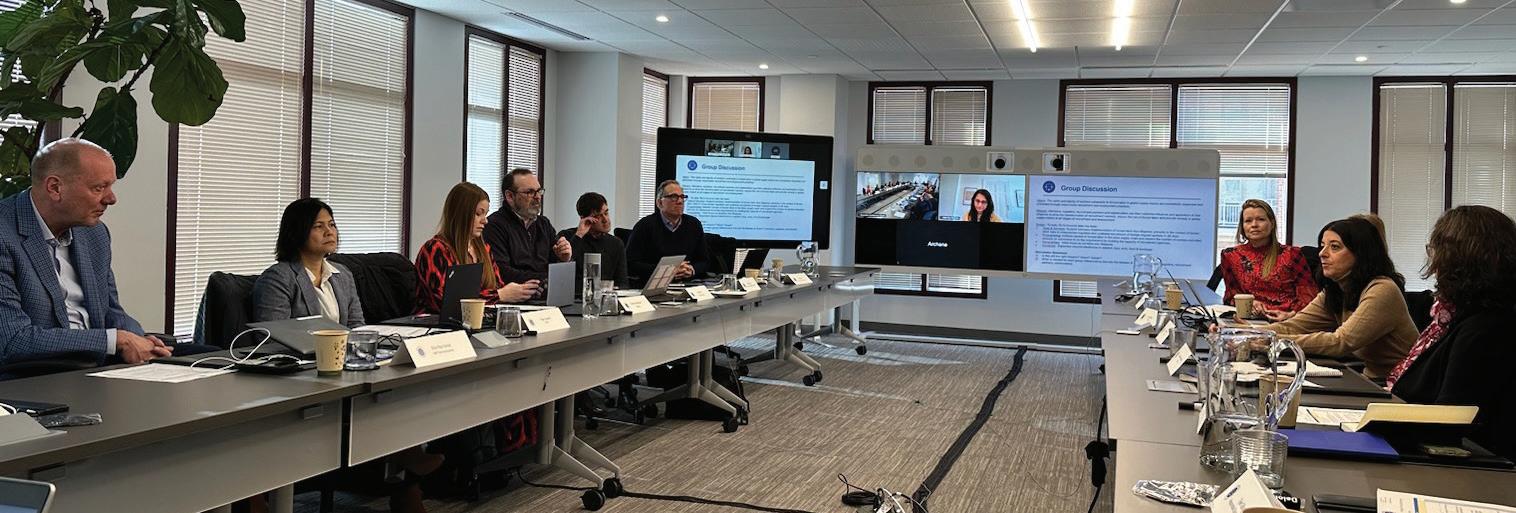
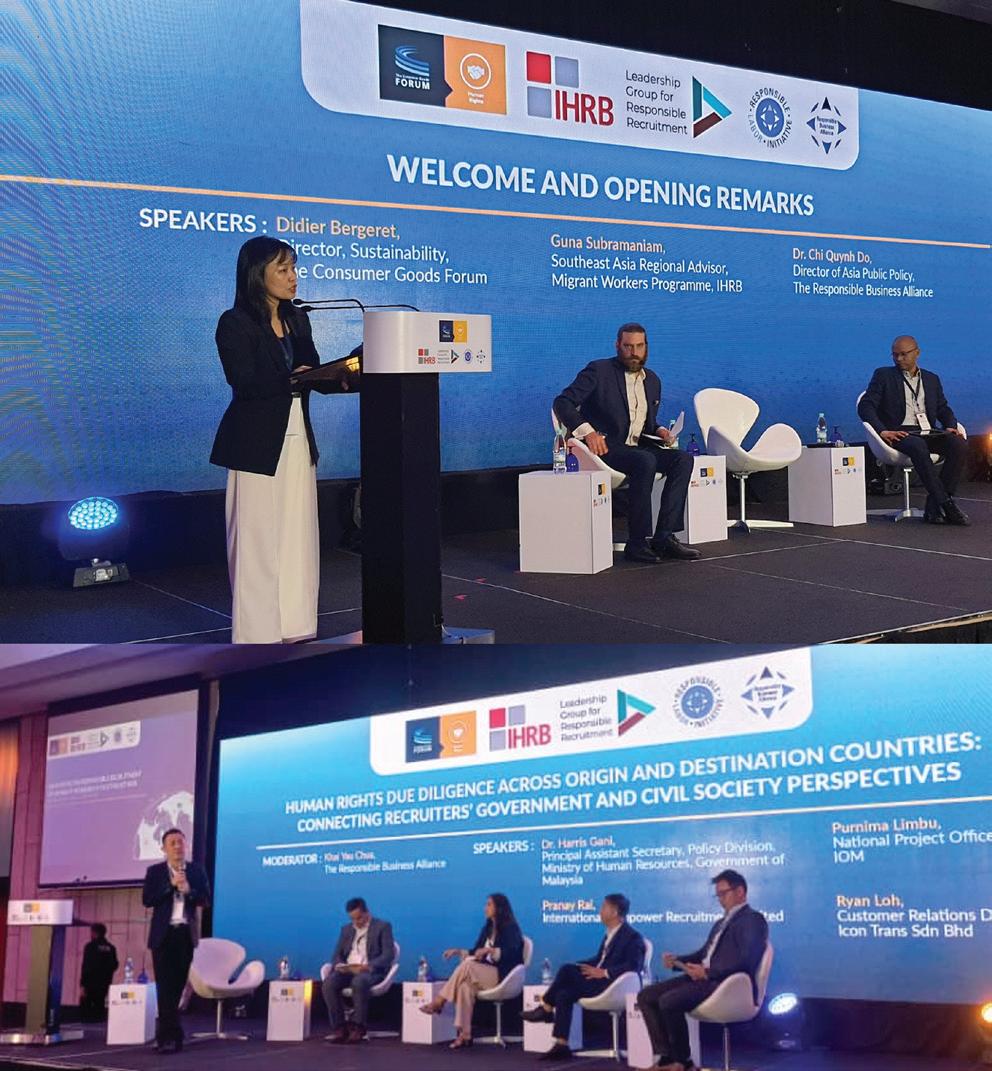
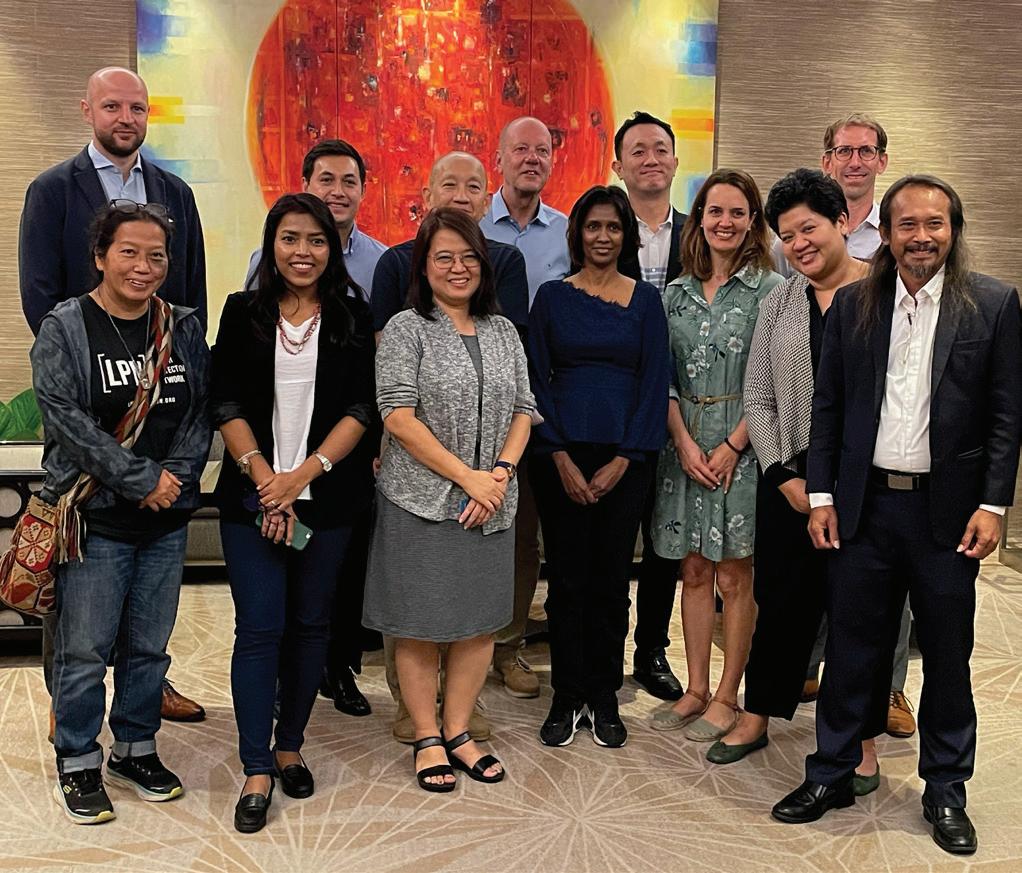
National Trade Blueprint, an important agenda for the development of Malaysia’s exports, which started in January 2023 and is expected to continue to the end of 2025. The RLI participates as an expert resource and advocates the importance of forced labor and human rights due diligence that needs to be factored in when forming policies impacting businesses from an environmental, social and governance (ESG) perspective. In 2023, the RLI spoke at the Ministry of International Trade and Industry (in February); the Ministry of Economy (in May); the Ministry of Science, Technology and Innovation (in July); and the Ministry of Agriculture and Food Security (in December).
The RLI was also a guest speaker at the Seminar on Combatting Forced Labor in Malaysia (in September), which was co-organized by the Department of Labour, Ministry of Human Resources and the National Strategic Office for the Council of Trafficking, Ministry of Home Affairs. The seminar gathered key stakeholders and related organizations to share knowledge regarding the measures taken at various levels to eliminate the practice of forced labor and human trafficking, in line with the government’s desire to achieve zero forced labor by 2030. It was at this same event that the Minister of Human Resources launched the Guidelines for Preventing and Eradicating Forced Labor Practices in the Workplace. The RLI was specifically invited to share its work and efforts on responsible recruitment.
Additionally, the RLI spoke at the plenary session of the UN Business and Human Rights Forum, Asia-Pacific (in June) about the unique challenges faced by migrant workers, and how the RBA and its Responsible Labor Initiative engage stakeholders to ensure that working conditions in supply chains are safe, that workers are treated with respect and dignity, and that business operations are environmentally responsible and conducted ethically.
In 2023 RBA concluded the second grant of the “Promoting Safe Migration in Malaysia Through the Transformation of Recruitment Practices and Standards in Supply Chains” program. The project, funded by the Walmart Foundation, was implemented by the RBA Foundation in close partnership with the International Organization for Migration (IOM).
Building on an earlier grant covering the period from 2018 to 2021, this project adopted a multipronged
approach to optimize strategic partnerships across stakeholder categories in countries of origin (Indonesia and Nepal) and destination (Malaysia). Benefiting from systems-thinking, the project was comprehensive and deliberately sought to engage all relevant stakeholders across the two migration corridors (Indonesia to Malaysia, Nepal to Malaysia), including jobseekers, migrant workers, civil society organizations, policymakers, regulators, private recruitment agencies (PRAs), supply chain employers, and buyers.
Project implementation was divided into two phases, beginning with an inception phase designed to raise awareness about the two migration corridors and garner the stakeholder support necessary for success. The inception phase involved research, data collection and targeted stakeholder engagement, including a desk review, the development of an economic incentive model for supply chain employers and PRAs, stakeholder outreach meetings, and a workshop for project partners to reflect on preliminary experiences and lessons learned to shape the implementation phase.
The main phase of the project included five components:
1. The Responsible Recruitment Program, which is the RBA Foundation’s main platform for engaging labor recruiters to encourage adoption of responsible policies and practices.
2. A pilot of the economic incentive model, which sought to test the surety bond model proposed in a feasibility study and create a dedicated code of conduct for participating buyers, suppliers, and recruiters to align their standards, expectations and practices on recruitment fees and costs.
3. A set of interconnected and mutually reinforcing training modules for migrant workers to cover each phase of the labor migration process, from pre-employment and pre-departure to post-arrival.
4. The expansion of the RBA’s worker helpline to reach beyond those directly associated with RBA member facilities, providing jobseekers and migrant workers with the means to seek effective remedy if their rights were violated.
5. Multi-stakeholder dialogue and engagement, which was sustained through meetings and roundtables that served to generate greater awareness, understanding and commitment across governments, civil society, buyers, suppliers, and labor recruiters.










































The external evaluation of the program concluded that the program was successful in having (a) generated genuine momentum in support of responsible recruitment among labor recruiters in all three project countries; (b) initiated vital interventions among stakeholders in both countries of origin, at community and national levels; and (c) tested comprehensive migrant-facing information and orientation programs as well as an expanded grievance mechanism, thereby pioneering coordinated efforts to link prevention and remedy in supply chains.

The need for increased focus and partnerships to promote migrant-facing engagement strategies, including awareness campaigns, post-arrival orientation, and workplace and community-based integration. This could include the development and socialization of comprehensive and integrated programming to enhance migrant worker voice and empowerment across recruitment, migration, employment, and remedy (where relevant).
Challenges faced included the continued use of hybrid business models by private recruitment agencies, which resulted in participating recruiters – even those reflecting a good faith desire to adopt principles of responsible recruitment – that could not formally or publicly be identified as responsible because a portion of their business relies on practices that are inconsistent with the RBA Code of Conduct. Also challenging was the need to support the private sector in identifying, mapping and verifying the activities and management systems of private recruitment agencies. The program concluded with a series of assessments and SVAPs on Forced Labor being conducted on qualifying participants.
The need for continued and sustained demand by RBA members and suppliers for responsible recruitment services in their supply chains. This demand and the collective power of RBA members should be leveraged to the greatest extent possible, both to insist on good practice in recruitment and migrant protection, and to actively promote and scale innovation in due diligence where supply chains and migration intersect. Suppliers should express a clear demand for ethical recruitment services and reinforce this with robust due diligence of recruiters, working only with those that have committed to good practice and migrant worker protection. Due diligence should extend to subcontractors, thus enabling the principles of ethical recruitment to cascade to lower tiers of supply chains.
Labor recruiters should ensure that all company policies and practices are aligned with international standards and the RBA Code of Conduct. All relevant staff should be trained on responsible recruitment and what it means in practice. In cases where recruiters rely on the services of subcontractors, all corporate policies and practices related to responsible recruitment should be effectively communicated to those subcontractors. Subcontractors, as part of their business relationship with the PRA, should formally commit to responsible recruitment and communicate this to stakeholders, including jobseekers and prospective migrants. A system of due diligence and oversight of subcontracted agencies should be established and maintained to increase transparency and compliance with the RBA Code of Conduct.
Leveraging their role as the (often) primary point of contact for jobseekers and migrant workers, private recruitment agencies should consider ways to enhance migrant-facing services to align them with good practices in migrant worker protection. There is a wealth of experience to draw from within the industry as well as across private sector, civil society, and intergovernmental stakeholders; this can be adapted, tested, socialized, and scaled in business operations as well as across industries, including involvement in migrant information campaigns, pre-departure and post-arrival orientation.

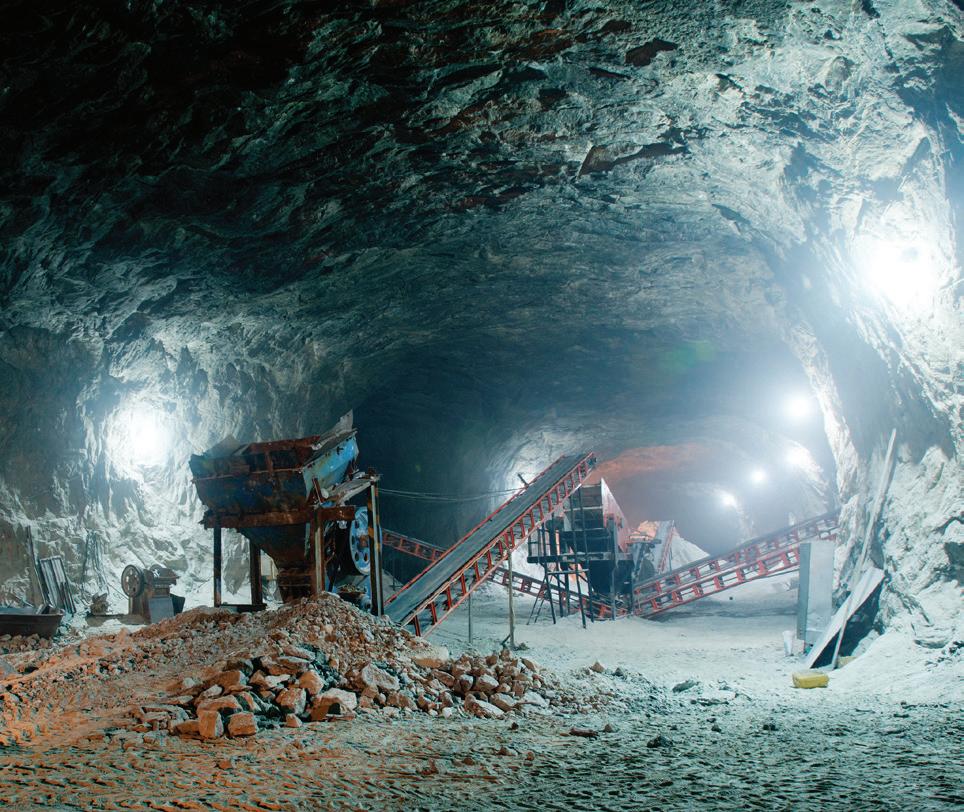


In 2023, the RBA’s Responsible Minerals Initiative (RMI) focused on analyzing and beginning to update tools and guidance to support members with regulatory compliance for existing and forthcoming regulations, while investing in improved analytical tools and systems.
In view of the significantly expanding regulatory landscape, the RMI continued work on tin, tantalum, tungsten, and gold (3TG), while also engaging with battery materials and other critical minerals, as well as environment, social, and governance (ESG) risks beyond the OECD Annex II in midstream and upstream supply chains. The RMI also supported training and capacity building for members, smelters, and auditors.
As the RMI’s research on smelters and refiners expanded with the addition of new minerals, the RMI invested in internal tools and databases for tracking and analytics of Responsible Minerals Assurance Process (RMAP) assessments and other due diligence information. The RMI also made significant improvements to RMAP, especially reducing assessment cycle time. RMAP also pursued
recognition and secured recognition by the London Metal Exchange (LME) on six of the RMI’s standards.
New compliance requirements for RMI members and suppliers across the supply chain create new challenges for industry but also opportunities for collaboration to improve due diligence systems and impacts. In 2024, the RMI will continue its work to align RMI standards, tools, and guidance with regulations and to support members and smelters to take effective action and lead industry best practices in responsible minerals sourcing.
Fifty-five new members joined the RMI in 2023, bringing the year-end membership total to 506. In addition to Partner Members, the RMI welcomed
two Upstream Members and two Vendor Members in 2023. Surpassing key milestones of 10 years and 500 member companies, the RMI membership program has supported companies' supply chain due diligence and risk assessment activities across a wide range of industries. The RMI continues to invest in its member-exclusive platforms and resources with the expansion of industry and regulatory due diligence requirements.
2023 was marked by significant developments in the regulatory space for battery and critical materials, with the adoption of the EU Battery Regulation, which entered into force in August 2023, the EU Critical Raw Material Act, and negotiations on the EU Corporate Sustainability Due Diligence Directive, among others.
The RMI launched a strategy and a portfolio of resources dedicated to critical minerals and battery materials that enable RMI members to collaborate on risk assessment, identification of pinch points, thirdparty verification of responsible sourcing practices, and risk mitigation practices.
As part of its efforts to engage smelters and refiners (SORs), the RMI launched a working group dedicated to emerging minerals. More than 80 representatives from RMI member companies joined the working group by the end of 2023. The working group serves as an umbrella for the activities of six mineral teams, one for each of the following materials: crude cobalt, copper, nickel, lithium, rare earth elements, and mica. The RMI offers a platform of collaboration to member companies that engage to map and research facilities in the supply chain of each material, coordinate SOR outreach activities and support the SORs to undergo third-party assessments and to progress in the execution of their corrective action plans. To support the work of its members, the RMI commissioned research on supply chain operations and structure and acquired marked data on top assets at a global level.
As a result of this work, in 2023, 140 facilities related to emerging minerals were determined eligible, of which 16 became active in the RMI assessment program to verify responsible sourcing and/or ESG practices, and 30 were in communication with the RMI with the purpose of entering the assessment program. In 2024, the RMI will extend the material in scope of the Emerging Minerals Working Group based on priorities established by its members.
To further support RMI members in risk assessment and mitigation, the RMI engaged key industry stakeholders including metal associations and think tanks including the International Lithium Association, the Rare Earth Industry Association, the Nickel Institute, the Cobalt Institute, the Responsible Mica Initiative, Drive Sustainability, and BGR. Due to the engagement, virtual learning sessions and two-way exchanges were organized over the year between the RMI members and representatives of the associations. In 2024, the RMI plans to expand the engagement to metal associations of new materials in scope.
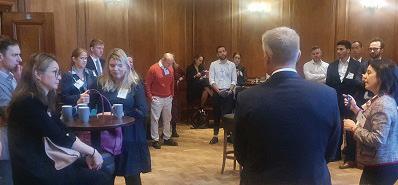
With the view of engaging national and local stakeholders of the nickel industry in its major producing country, the RBA and the RMI conducted a one-week visit to Indonesia where they met with representatives of government, industry, and civil society. The RBA and the RMI discussed the supply chain due diligence requirements set out in emerging regulations, their applicability to nickel supply chains, challenges faced by the Indonesian nickel industry and pathways forward. Traceability and ESG issues were at the top of the agenda in all stakeholder discussions. During the visit, the RMI also connected with the commodity exchanges (FJX and ICDX) that recognize the RMI’s Responsible Minerals Assurance Process (RMAP) as part of their responsible sourcing requirements for listed tin exporters. The RMI updated the exchanges on changes in the assessment program and, as a follow-up, conducted a virtual training with 25 tin facilities listed on ICDX.






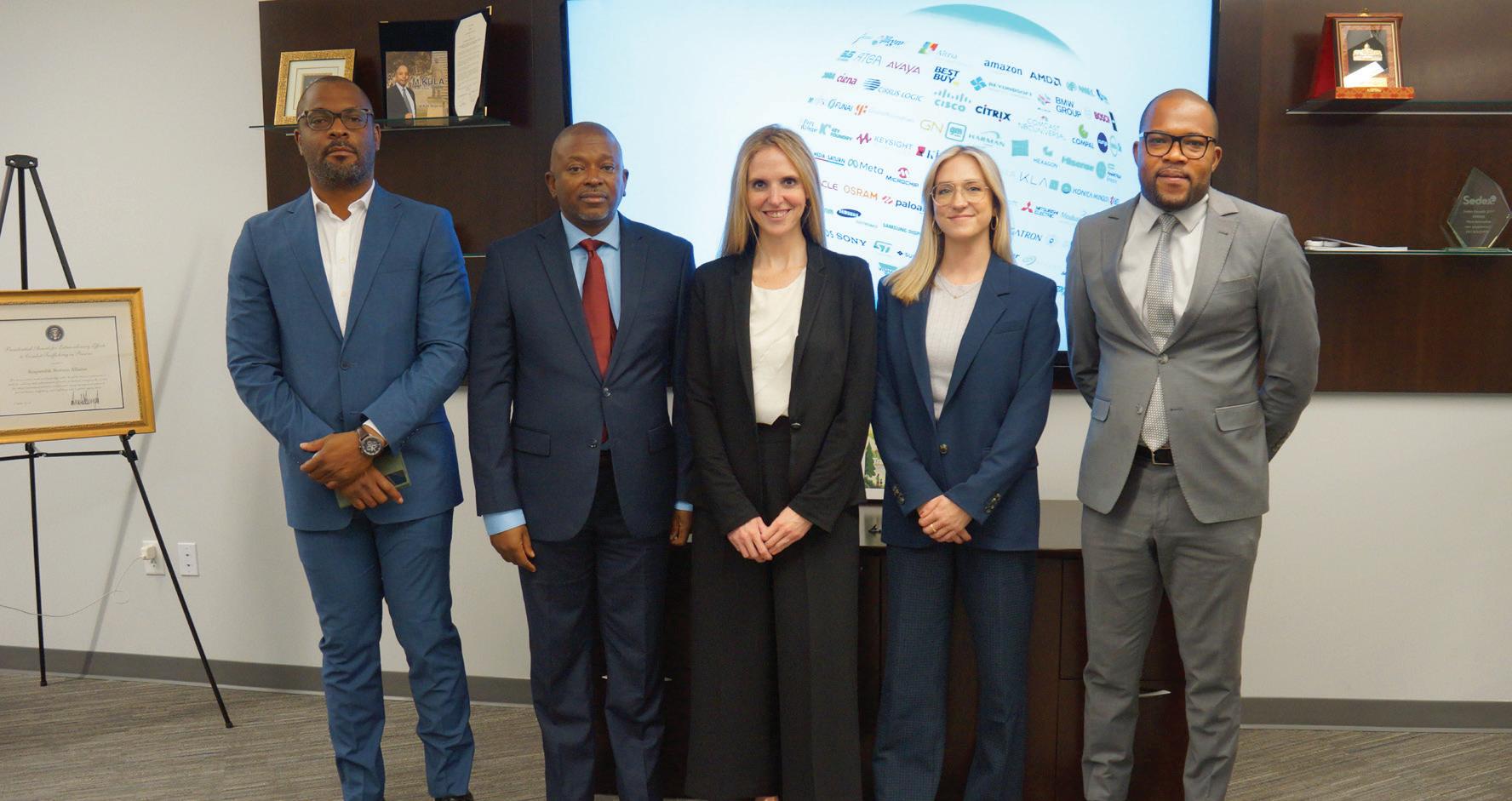
While expanding its portfolio to emerging minerals, the RMI continues to focus on supporting members in meeting responsible sourcing requirements for 3TG. To clarify the due diligence responsibilities of downstream companies, the RMI developed a guideline that outlines recommended due diligence steps by downstream companies and explains how the RMI tools can be used to support the required due diligence. The guideline covers management systems, risk identification and management, pinch point assessments, and public reporting.
In 2023, the RMI worked with its members on the Due Diligence Practice Team to develop guidance on the EU Battery Regulation’s due diligence requirements. The guidance helps members understand the regulation and the relevant RMI tools available and will be updated as new delegated acts are adopted.
The RMI’s Mineral Reporting Template Working Group expanded the Pilot Reporting Template (PRT) to enable companies to collect mines of origin data, which are part of regulatory demands on downstream
companies. The PRT is being piloted and will help members with supply chain mapping of their minerals.
The RMI continued to ensure that the standards and implementation of its assessment programs, the RMAP, Downstream Assessment Program (DAP) and ESG, were aligned with the best practices set forth by the Organization for Economic Co-operation and Development (OECD), United Nations Guiding Principles on Business and Human Rights (UNGPs), and regulatory and market requirements. The RMI’s RMAP achieved an important milestone in 2023, when the standards for 3TG received full OECD alignment. The assessment was conducted by an independent assessor, as part of the RMI’s application for EU recognition. Based on the assessment, the RMI is pending formal approval from the EU Commission for the purposes of recognition under the EU Conflict Minerals Regulation, anticipated in 2024.
The RMI’s Global Responsible Sourcing Due Diligence Standard for Mineral Supply Chains - All Minerals achieved recognition by the London Metal Exchange (LME) in 2023 based on the OECD Alignment Assessment Methodology. This is the sixth RMI standard to be conditionally approved by the LME. It is the RMI’s first mineral-agnostic standard with





























stop solution for ESG risk-sensing in the entire supply chain (from mining through smelting and refining, to fabricating, manufacturing and recycling). The RRA 3.0 will serve as an input for the planned revision of the RMI’s ESG Standard in 2024.

all upstream actors in scope; this includes not only smelters, refiners and processors, but also mining operations, upstream traders, and exporters. The Standard is applicable to single-metal and multimetal facilities producing, sourcing, and processing metals worldwide. The RMI continues to work closely with the LME to complete the full approval process. Recognition by the LME allows auditees to meet the LME’s requirements on environmental management and occupational health and safety management through a single assessment.


To support members on ESG risk assessments driven by the new supply chain due diligence regulations, the RMI finalized the revision of the Risk Readiness Assessment (RRA) Criteria. The revision was conducted jointly with The Copper Mark, which led to version 3.0 of the Criteria and Criteria Guide, both released in October 2023. The RRA 3.0 was expanded both thematically and in its applicability. It includes all risk areas outlined in the EU Battery Regulation as well as human rights, environmental and climate goals that are enshrined in global conventions and agreements, like the UN Guiding Principles on Business and Human Rights, the ILO conventions, the Paris Agreement, and OECD guidelines. With version 3.0, the applicability of the RRA Criteria has been extended to downstream companies and recyclers, which makes the tool a one-
The digital platform Material Insights has added 20 new materials, including an analysis of ESG issues for each material, leading to a total of 45 materials in the platform. The new materials include those in scope of the EU Battery Regulation, like natural graphite, lithium, cobalt and nickel. Four component profiles were developed for batteries, magnets, printed circuit boards, and glass. The battery profile includes an ESG issue matrix for different chemistries such as LFP, NCA and NMC. Data and information contained in the Material Insights platform serve as guidance for RMI members in their risk assessments and prioritization. In 2024, the platform will be expanded to include a geographical risk map for each material, information on risk mitigation initiative and applicable standards.
The RMI invested in upgrading its Global Risk Map, which is a risk assessment tool that allows users to identify and compare governance, human rights, and conflict risk indices across geographic regions globally. The upgrades include comprehensive ESG country risk information, based on 30 internationally accepted indices, expanding this tool that historically focused on the OECD Minerals Due Diligence Guidance Annex II risks.

Throughout 2023, the RMI took steps to integrate the Facility Database into the RBA-Online platform and enhance its functionality, and to unify previously separate platforms, one for assessments and the other for facility data. With the RMI’s growing membership and expanding program scope, this change will enhance the member and facility experience by digitizing processes, streamlining workflows, improving efficiency, and enabling scalability. The platform updates dedicated significant consideration to the RMI members involved in the Smelter Engagement Team (SET) and specifically designed the functionality of the new platform to allow the SET team to automate tasks such as adding alleged facilities, submitting Company Information Questionnaires (CIQs), manage subteams, and tracking facility progress throughout the assessment process.
The RMI continued piloting the RMI’s ESG Standard, which is ISO-aligned and recognized by the LME, in combination with RMAP, in China and the Democratic Republic of the Congo (DRC), and has planned assessments underway in India and Indonesia. Based on the outcomes of the pilots, the RMI plans to revise and expand the ESG Standard to address areas of improvement as well as align with the RMI’s revised RRA and expanding regulatory requirements. The RMI’s ESG Standard will be expanded in 2024 to incorporate not only facility level risks but broader supply chain risks from the mine level upstream to the recycler level downstream.
In the first quarter of 2023, the RMI finalized the pilot assessment tools for the implementation of the Artisanal and Small-Scale Mining (ASM) Cobalt Normative Framework (formerly ASM Cobalt Criteria draft) at ASM sites in the DRC. The RMI continued to work with stakeholders in 2023, including government representatives from the DRC, United States, and European Union, and engaged the U.S. Department of Labor’s Global Trace Protocol (GTP) project, the Cobalt Institute, NGO Impact, and the International Labour Organization (ILO) to promote collaborative, scalable solutions that address the root causes of human rights issues linked to the mining of artisanal cobalt in the DRC. The RMI remains ready to pilot the ASM Cobalt Normative Framework once a final list of sites for pilot implementation is confirmed by DRC stakeholders.
The RMI also continued use of and support for the Minerals Grievance Platform (MGP), which provides RMI members and stakeholders with a platform to submit allegations and grievances related to mineral supply chain entities linked to the RMI and the programs that it cross-recognizes such as the London Bullion Market Association (LBMA) and the Responsible Jewellery Council (RJC). In 2023, five grievances were received by the RMI. This included:
l Three grievances that were deemed out of scope as there was no linkage to a facility or smelter recognized by the RMI.
l One grievance that was related to the credibility
of mineral sourcing of a facility cross-recognized by the RMI. Following receipt of the grievance, the RMI contacted the LBMA and requested confirmation of receipt and an update on the review and closure of grievance. The LBMA provided a public update on the matter on its website, which was accepted by the RMI.
l One grievance that was related to a facility on the RMI's public conformant list, however, the issues flagged were beyond the scope of the RMAP assessment and therefore did not impact the entity's conformance status.
The RMI plans to update its grievance mechanism platform and process in 2024. RMI members and stakeholders can learn more about the RMI’s grievance process on the RMI website.
Since publishing the report, “Researching the Role of Aggregators and Crude Refiners in the Gold Supply Chain” in 2021, the RMI has continued to explore opportunities to extend minerals due diligence beyond the traditional pinch point of fine refiners in mineral supply chains. To that end, the RMI presented the role of aggregators and crude refiners in minerals due diligence at the OECD Forum on Responsible Mineral Supply Chains in 2023. Subsequently, the RMI engaged key stakeholders, such as the Alliance for Responsible Mining (ARM), to identify priority aggregators and crude refiners in Latin America, including Brazil, Colombia and Peru. This engagement, alongside efforts of the RMI’s member Gold Working Group, led to a member visit to a gold crude refiner in Peru. As a result, the crude refiner participated in the RMAP and the RMI used lessons learned to inform the continued piloting of crude refiner-level engagement. The RMI also participated in the LBMA’s artisanal and small-scale mining working group that builds on the RMI’s approach, encouraging fine refiners to utilize RMAP for due diligence on their supplying aggregators.
In 2023, the RMI collaborated with ARM and RESOLVE to revise the code for the mitigation of risks in artisanal and small-scale mining, forming transparent and legal chains (CRAFT), an open-source mineral agnostic ASM standard. The revision was focused on fully aligning CRAFT to the OECD Minerals Due Diligence Guidance, so the RMI could formally recognize the CRAFT Standard. The revised version
of CRAFT (2.1) was completed and published for consultation in 2023.
The RMI’s Upstream Due Diligence Fund is a costsharing mechanism funded by RMI membership to support upstream supply chain actors conducting due diligence and upstream mechanisms applying for recognition by the RMI. In 2023, the RMI granted funds to two projects, including a smelter’s independent upstream due diligence/on-the-ground assessments to support their RMAP conformance, and the OECD alignment assessment for a new upstream mechanism for the purposes of the RMI upstream recognition. The total amount of funds distributed from the Upstream Due Diligence Fund in 2023 was $20,000.
In 2023, the RMI organized a range of training programs to promote good practice, including the RMI RMAP Global Virtual Training for assessors and participants of the RMAP program. The RMI also held an in-person RMAP training in China, which had record attendance. To increase understanding of the RMI Global Risk Map and its new enhancements, as well as the new Guidance for Downstream Companies on how to use RMI tools to support their due diligence efforts, the RMI also conducted several virtual training sessions.
The RMI updated its free online e-learning platform with an updated training catalogue and recommended learning plans tailored to members, suppliers, assessors, and assessment program participants. The RMI currently provides more than 50 animated training courses and recorded webinars through this online platform.
The RMI strengthened and formalized its technical assistance program in 2023. In its first year of deploying dedicated technical assistance staff, the RMI Technical Assistance team successfully supported 170 facilities in the areas of assessment preparation and closing Corrective Action Plans (CAPs), leading to the achievement of conformant status. The RMI Technical Assistance team created resources and engaged program participants on site. The RMI experienced nearly 70 percent growth in the technical assistance program in Q4 of 2023 and anticipates further growth in 2024, with plans to hire additional staff to meet the high demand.
The number of total assessments facilitated by the RMI grew by 19 percent in 2023, primarily through the RMI’s encouragement of facilities to maintain conformance status and the RMI’s expansion to new minerals.
The RMI Operations Team delivered 176 RMAP assessments (49 initial assessments and 127 reassessments) and 18 DAP assessments (11 initial assessments and 7 reassessments). Out of 176 RMAP assessments, 75 resulted in a Corrective Action Plan with an average of one round of CAP.
Top 5 Most Common Non-Conformances in 2023:
1. The company’s expectations that suppliers will undertake mineral supply chain due diligence and risk management consistent with the standards defined in Annex II of the OECD Due Diligence Guidance are not communicated to suppliers via contracts and/or written agreements.
2. Inconsistent implementation of the Know-YourCounterpart (KYC) process.
3. Supply Chain Policy missing critical elements.
4. Procedure to identify conflict-affected and highrisk areas (CAHRAs) missing critical elements and/or implemented inconsistently.
5. Absence of step 5 Public Due Diligence Report.




As companies revisit sourcing strategies and supply chains become increasingly volatile, members look to the RBA for programs and services to support their suppliers. The Responsible Factory Initiative (RFI) is specifically designed to address this need.
Facilities that join the RFI are guided through assessments, complete trainings, and are provided consulting support to drive improvements in their performance against the RBA Code of Conduct.
The RFI is a membership program intended for nonRBA member facilities in which suppliers participate in the Factory Engagement Program (FEP), take the Factory Lead Certification (FLC) courses, and have an account manager that provides guidance and support throughout their membership.
Factory Engagement Program: The FEP includes a self-assessment verified by RFI staff, followed by an on-site assessment to determine the facilities’ policies and operations against the RBA Code of Conduct.
From there, an improvement plan is developed with support from RFI staff, who then guide the facility through the implementation of the plan.
Factory Lead Certification: The FLC courses, which are available on-demand via the RBA Learning Academy, cover each section of the RBA Code of Conduct and are designed for individuals who are response for implementing the Code at their facility.
Facilities that have a Certified Lead perform 24-35 percent better on assessments than those facilities that do not.
Consulting Support: What differentiates the RFI from many other programs is the consulting support members receive from account managers, who have deep expertise in improving suppliers’ Code of Conduct performance.
The RFI program made several updates in 2023 that sought to improve the program’s effectiveness. In early 2023 a new staff member was brought on to support the anticipated growth of the RFI. The additional headcount enabled each member to get a higher level of support as we sought to optimize the number of RFI members guided by each account manager.
To support the strategic development of the RFI program – addressing topics such as the tools, trainings, and assessment methodology – an Advisory Committee was formed. The committee is primarily comprised of RBA members that had multiple suppliers join the RFI.
One objective of the RFI is to ensure that members are aware of and prepared for the implications of current and emerging regulations, which drive changes to the way companies are expected to manage labor and environmental risks in their supply chain. For example, certain EU regulations require factories to have an effective grievance mechanism. In response, the RBA developed RBA Voices, a worker voice platform that includes worker surveys, on-site assessment support, mobile learning, and feedback and grievance reporting. In 2023, the RFI expanded its offering for members, providing access to the RBA Voices worker feedback tool at no additional cost.
The RFI held trainings in 2023 to further support RFI members in preparing for regulations. The first covered the regulatory requirement for facility-level grievance mechanisms, and highlighted RBA Voices as an option for RFI members. A second training was hosted by the RBA’s Public Policy team, which provided an overview of some of the most comprehensive regulations affecting suppliers today and previewed the regulations that will likely have significant impact on how companies need to manage supply chain risk in the coming years.
The RBA ran a pilot of the RFI program in 2022, primarily supporting factories in China. As we more formally relaunched the RFI in 2023, the number of members more than doubled and the geographic distribution of members expanded to include Korea, Chinese Taipei, Japan, Malaysia, and the United States, in addition to China.
One measure of success for the RFI is the improved alignment to the RBA Code of Conduct that facilities realize over the course of their membership. The improvement plans typically do not address all gaps at a facility and we initially focus on addressing Priority Non-Conformances and material gaps in relevant management systems. As improvements are made by a facility, RFI staff reviews evidence of Code alignment and there are often three cycles of evidence review within a single membership year. Analysis conducted in Q3 of 2023 showed improved performances of up to 17 percent after two cycles and the RFI expects to see improved Factory Engagement Program (FEP) assessment scores in the range of 20-25 percent after three evidence review cycles. Further, RBA Validated Assessment Program (VAP) scores should increase significantly, given the VAP’s heavy weighting of priority and majors findings, which are the focus of RFI FEP efforts.
In 2023, the RFI also implemented two surveys to gather feedback from RFI members as well as RBA members that had suppliers in the RFI program. The vast majority of respondents had highly positive views of the RFI program.
The RFI team continues to focus on ways to make the program more efficient and effective, and several plans for 2024 seek to achieve these objectives, including: Updates to the SAQ and RFI process within RBA-Online to increase flexibility and make the RFI more useful for suppliers looking for support; improved alignment of RFI tools and assessment protocol with the RBA VAP, to help RFI members improve results; continued trainings on topics most relevant to RFI members; and expanded offerings, such as FEP closure assessments, customized inhouse trainings, and recruitment and employment fee investigations.




Recognizing the growing importance of environmental and sustainability issues to RBA member companies, the RBA launched the Responsible Environment Initiative (REI) in the spring of 2023. Its mission is to address environmental sustainability and chemical management challenges and develop tools and services to improve environmental performance across the entire value chain.
The Responsible Environment Initiative demonstrates the RBA’s dedication to partner with RBA members and external stakeholders and commit resources and solutions to increasingly complex environmental challenges. It operates cross-functionally with other RBA initiatives, such as the Responsible Minerals, Labor and Factory Initiatives, to address environmental value chain challenges, including greenhouse gas measurement and reporting, circular economy, and process chemical risk management.
The REI is guided by a Senior Environmental Advisory Taskforce (SEAT), consisting of executives from RBA member companies. This taskforce provides advice and counsel to the RBA team that staffs the REI on relevant policies and priorities to ensure it fulfills the greatest needs of RBA members and their industries.
There are two workgroups that facilitate RBA member engagement in the REI: the Environmental Sustainability Working Group, and the Chemical Management Working Group. During 2023, the Initiative’s inaugural year, the REI focused on four priority issues that were identified by RBA members as important for RBA engagement: decarbonization, chemical management, water stewardship, and circular materials.
The RBA’s Emission Management Tool (EMT), launched in April 2023, is a standardized greenhouse gas (GHG) emissions tool for calculating and reporting industry emissions in RBA member supply chains. The EMT leverages the RBA’s capability to map industry








The Responsible Environment Initiative demonstrates the RBA’s dedication to partner with RBA members and external stakeholders and commit resources and solutions to increasingly complex environmental challenges.














supply chains and create efficient and accurate methods for sharing emissions at corporate and facility levels. While the EMT leverages the trading relationship structure of RBA-Online, the EMT tool is powered by Optera, a leading platform provider; this allows for capacity building potential as the tool can apply correct emissions factors to consumption data to calculate a GHG inventory or use industry average data to estimate the emissions for a facility. The EMT supports measurement and reporting capacity building and mature GHG practices throughout global supply chains. In 2023, REI staff provided EMT demonstrations and capacity-building opportunities for members and suppliers in more than six countries.









human health and the environment.
By deploying a common tool among RBA members and suppliers, the EMT creates reporting efficiencies along the supply chain, eliminating over 1,000 redundant or duplicate requests to suppliers in 2023, in turn allowing suppliers and their customers to better prioritize GHG emission reductions. The standardized EMT methodology also ensures that calculations are more accurate and based on methods that align to the GHG Protocol.



In 2024, the RBA will continue to promote EMT uptake and prioritize working with members and users of the EMT to explore how EMT data can be used to identify common carbon “hot spots” and opportunities for collective GHG emission reduction action.
With support from the REI’s Senior Environmental Advisory Taskforce, chemical management was included in the REI in 2023 to recognize the importance of chemical selection and use in meeting worker health and safety as well as global environmental, climate, and social goals. The RBA has long recognized and provided solutions toward improving chemical management systems across supply chains. Incorporation of such programs within
In April 2023, the RBA officially launched the Specialty Validated Assessment Program on Chemical Management (SVAP-CM), which is an assessment process used to evaluate and address chemical safety risks, including hazardous occupational exposures and chemical emergencies. SVAP-CM assessments are conducted by specialized auditors that have unique expertise in industrial hygiene and occupational safety. The elements of the SVAP-CM were carefully developed by the RBA with input from stakeholders, members, and third-party subject matter experts. The SVAP-CM’s scope focuses on RBA Code of Conduct provisions related to chemical management to provide a unique assessment program for better evaluation of facilities’ chemical safety risks. The SVAP-CM isn’t designed to expand upon RBA Code of Conduct requirements, but it provides a deeper dive on these provisions through additional complimentary criteria that more acutely assess occupational safety, industrial hygiene, emergency preparedness, hazard communication, and the management of hazardous substances.
In 2023, the RBA explored the development of an RBA program to credibly identify and commend industry leaders that are advancing chemical management due diligence practices across supply
chains. In addition to promoting awareness, adoption, and dissemination of more sustainable chemical management principles, the RBA’s Chemical Leadership Recognition Program (CLRP) will drive collective action, increased transparency, and harmonization of supply chain chemical management standards. The CLRP is expected to be finalized and launched in 2024.
Partnering with the Alliance for Water Stewardship (AWS), the RBA launched a water survey in 2023 for RBA members and their suppliers to promote the tracking of water utilization and efficiency. The survey aligns to leading industry practices identified by the AWS and WWF Water Risk Filter so that collected data not only drive internal decision making, but also can be used in the latest risk and maturity assessment tools. By understanding not only the facility operations but also the localized context, RBA members and their suppliers can be empowered to transition to better water stewardship practices.
As RBA member companies begin and accelerate their journeys toward circular economies, the REI is ready to support their efforts. For example, REI staff are working closely with the RBA’s Responsible Minerals Initiative (RMI) to ensure due diligence processes for minerals and metals can also be applied to scrap and recycled content. The RBA is also a founding partner and expertise contributor of the Circular Electronics Partnership, which facilitates collaboration between industry, partners, and other stakeholders to address collective barriers to circularity across the value chain. More circular material initiatives are planned for 2024 to close the gap between downstream materials and upstream processors to achieve circular material solutions.
In December, the RBA’s environmental team attended the United Nations Climate Change Conference, COP28, in Dubai, UAE. As a recognized NGO Observer, the RBA was permitted in the COP Blue Zone where the team shared members’ experiences with key stakeholders and governments, speaking publicly on the need for greater supply chain collaboration, and highlighting the RBA’s Emissions Management Tool to support standard and efficient GHG calculation and reporting for members and their suppliers. For more information on the REI: ResponsibleEnvironment.org















The Responsible Glove Alliance (RGA) is an initiative of the RBA launched in March 2022, established to prevent, identify and remediate conditions that contribute to forced labor in the medical supplies industry. In 2023, the RGA Steering Committee voted to expand its scope beyond forced labor, covering implementation of high standards of ESG due diligence in supply chains.
In 2023, the RGA focused on strengthening its operating procedures, enhancing its membership requirements, and establishing higher compliance standards. As part of the RBA ecosystem, the RGA continued to work and support members in their supply chain due diligence journeys through standardized tools, processes, and learning opportunities.
The RGA began with eight members in 2022 and added two more in 2023. During the year, members were introduced to various risk assessments tools, including the RBA’s Risk Assessment Platform, the SAQs, and the SVAP on Forced Labor.
The RGA organized a refresher training on the SVAP for its members and suppliers in 2023, supplementing the series of training for members and suppliers conducted the year before. The event was organized at the side of the RBA Outreach Meeting in Malaysia, for which many RGA members were also in attendance. Since its inception, the RGA has trained more than 130 individuals from member companies and their suppliers on the SVAP on Forced Labor and the Responsible Recruitment Due Diligence Toolkit.
In addition, RGA members were also provided access to other resources such as the e-Learning Academy as well as regulatory development updates by the RBA Public Policy team.
The RGA team continued to support government and stakeholder engagement throughout 2023, including












ongoing interactions with the government of Malaysia as well as representatives from the U.S. government and the European Union, with the support of or in coordination with the RBA Public Policy team. Some highlights from numerous consultations and meetings included:


l The inaugural RGA Annual Conference, Responsible Glove 2023, was held in September in Kuala Lumpur with more than 220 attendees. Key speakers included the Deputy Minister of Human Resources of Malaysia, the British High Commissioner to Malaysia, high-level representatives from the Ministry of Home Affairs Malaysia, U.S Customs and Border Protection, the U.S. Embassy, and the Delegation of the EU to Malaysia.
l The RGA and its members were invited to meet with U.S. Ambassador-at-Large to Monitor and Combat Trafficking in Persons, Cindy Dyer during her visit to Malaysia in October of 2023. The RGA was the only private industry group that met with the ambassador to deepen understanding and collective coordination on anti-trafficking efforts.
l The RGA participated in a roundtable with the UK Envoy for Modern Slavery, during the Envoy’s visit to Malaysia in February of 2023. The Envoy presented the UK government’s anti-trafficking in persons efforts and key areas of focus, including a guidance document on Tackling Modern Slavery in Government Supply Chains. The RGA was the only private-sector representative at the roundtable and shared its approach in supply chain due diligence.











The issues covered by these new and emerging regulations ranged from forced labor risks to responsible minerals sourcing to environmental stewardship. Increased regulatory requirements, including through trade instruments and mandatory due diligence legislation, and changing investor and customer expectations on companies’ environmental, social, and governance performance, are raising the bar for companies and their supply chains. The RBA has been helping its members prepare for and meet the requirements of key regulations for years, educating policymakers on best practices, and encouraging harmonization of requirements based on internationally recognized standards. Those efforts accelerated in 2023.















In 2023, policymakers from Europe to Asia to the Americas stepped up efforts to legislate responsible business conduct and mitigate the effects of climate change.





























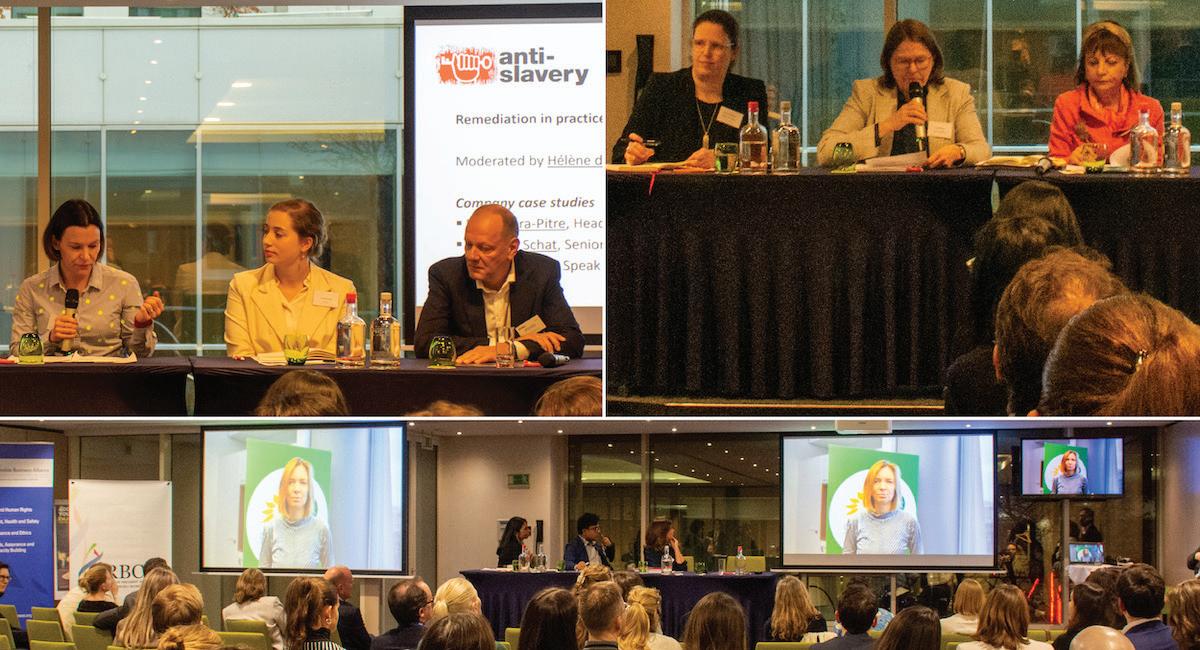


l More than 350 meetings with policymakers worldwide to inform emerging policies and explain the RBA’s ongoing supply chain sustainability efforts.
l Participation as a plenary speaker at the 2023 UN Business and Human Rights Forum to discuss responsible policy engagement.
l New collaborations with governments around the world, such as an MOU signed with Japanese authorities toward greater synergies in the space of responsible recruitment corridors.



l Industry capacity-building trainings on the implementation of mandatory due diligence legislation and navigating its impacts, in key Asian countries, benefiting more than 1,200 RBA members and suppliers.






l Numerous public policy webinars and analyses to inform RBA members on key developments worldwide – ranging from California’s climate bill to the EU Sustainability Reporting Standards to the revised OECD MNE Guidelines.
l Partnerships with leading EU policymakers, with the aim of ensuring that emerging EU legislation – including the EU Corporate Sustainability Due Diligence Directive and EU Forced Labor Regulation – align with existing standards, increase harmonization of responsible business conduct rules, and incentivize collaborative approaches to supply chain due diligence. For example:
The 2023 RBA European Conference convened key MEPs behind EUCSDDD, member states and Commission officials, leading CSO voices, and RBA membership.
The RBA hosted important dialogues between the EU Commissioner for Justice and industry executives in key countries such as Japan and Korea.
The RBA co-hosted an MEP dinner at the European Parliament plenary to discuss the EUCSDDD’s approach to industry and multi-stakeholder initiatives.
The RBA, the European Parliament Responsible Business Conduct Working Group, and Anti-Slavery International cohosted a multi-stakeholder conference, “Remediating forced labour through collaboration: lessons learned from practice,” to inform EU forced labor regulatory discussions.
l Meetings with government officials in major producing and sourcing countries, including Malaysia, Japan, Korea, Thailand, Indonesia, India, Mexico, and Vietnam.
l Engagement with U.S. government agencies, including the U.S. Departments of Homeland Security, State, and Labor, as well as the Office of the United States Trade Representative (USTR), and U.S. Congress, on a wide range of responsible sourcing issues.
l Meetings with Canadian and Mexican authorities to inform ongoing forced labor policy reforms and the implementation of new legislation.
l Engagement with the Malaysian government regarding the design of its National Action Plan on Forced Labor, encouraging them to meet international standards on forced labor due diligence and leverage RBA and RLI tools for firms employing foreign migrant workers.
l Substantive feedback on the review of the OECD MNE Guidelines, as part of wider strategic engagement with OECD on key responsible business conduct themes.
l Workshops to support members’ preparedness for specific due diligence legislation, such as the Norway Transparency Act, the German Supply Chain Due Diligence Act, EU Batteries Regulation, etc.
l Participation as plenary opening speaker at OECD Ministerial Meeting on "Promoting and enabling responsible business conduct in the global economy."



















RBA members and their suppliers face increasingly complex responsible sourcing dynamics, from geopolitical tensions to current and emerging regulations. Companies need to adopt leading practices to effectively manage supply chain risks and often look to RBA programs, services, tools and guidance for solutions. No other organization is better positioned to support members and their suppliers than the RBA and its Advisory Services.
In 2023, the RBA’s Advisory Services continued to support members across a wide range of projects. For example, in partnership with the RBA’s Responsible Labor Initiative, Advisory Services developed a series of trainings on forced labor that was delivered to hundreds of suppliers in Malaysia, Japan, Thailand, and Chinese Taipei. Advisory Services also supported individual member companies that sought to train suppliers and labor agents on the responsible recruitment of workers – an increasingly critical topic given the emergence of forced labor regulations in several countries. Some members also had Advisory Services on retainer to support and augment their internal teams – getting longer-term, in-depth support











for multifaceted responsible sourcing efforts. Other Advisory Services consulting projects in 2023 included customized trainings, fee investigations, VAP assessment preparation, and the management of corrective action plans, among others. A growing number of these projects were collaborative, with the RBA bringing together multiple members.










With the implementation of RBA’s Code of Conduct 8.0, and the ongoing increase in supply chain-related regulations, the demand for Advisory Services continues to grow. In 2024, the RBA plans to add additional resources to meet increased demand for its trainings and consulting services.






















From the launch of the RBA’s online Learning Academy in 2014 to the end of 2023, more than 256,000 courses have been completed by learners. Approximately 11,150 new accounts were created in 2023 alone and there were about 56,000 course completions.







In 2023, the RBA continued to expand its library of training for members and their suppliers, adding the following courses:
l RBA Introduction (Japanese)
l RBA Code of Conduct (Thai, Malay)





l Indirect Spend for Suppliers (English, Spanish, Simplified Chinese)















Top 10 Learning Academy Courses in 2023:


1. RBA Code of Conduct – Labor



l Responding to an Infectious Disease (Spanish)
l Understanding Living Wage (English)
l Open-Source Due Diligence

l Working Hour and Payment Verification Techniques
l GHG Management (English, Simplified Chinese)





Within the Learning Academy in 2023, there were more than 100 completions of the Factory Lead Certification Program, a training and certification program for factory staff. Factory Lead Certification is an important component of the Factory of Choice (FoC) and other Responsible Factory Initiative (RFI) programs. Factories with a Certified Factory Lead have 26 percent to 34 percent higher audit scores (varies by industry), fewer priority findings, and fewer overall findings.








From the launch of the RBA Learning Academy in 2014 to the end of 2023, more than 256,000 courses have been completed by learners.














2. RBA Code of Conduct – Ethics


3. RBA Code of Conduct –Management Systems




4. RBA Code of Conduct – Health and Safety
5. RBA Code of Conduct – Environment



6. Working with Students and Young Workers
7. Working with Labor Brokers
8. RBA Introduction
9. RBA Code of Conduct – Ethics (in Simplified Chinese)
10. RBA Code of Conduct – Management Systems (in Simplified Chinese)

Instructor-Led Trainings
In 2023 the RBA held 20 virtual Code of Conduct and VAP assessment preparation trainings for nearly 800 participants. The RBA also held trainings on its Specialty Validated Assessment Program (SVAP) on Forced Labor, as well as in-person forced labor and responsible recruitment trainings in Bangkok, Hanoi, Penang, Taipei City, and Tokyo.





Visit the Learning Academy website


















More than 4,275 people attended at least one of the RBA’s conferences, outreach meetings, or trainings in 2023, including the Responsible Business annual conference in Santa Clara, California; the European Conference in Brussels, Belgium; the Responsible Glove conference in Kuala Lumpur, Malaysia; and Outreach Meetings in five countries.















In 2023 RBA hosted five in-person Outreach Meetings, for more than 1,275 total participants, in Guadalajara Mexico; Bengaluru, India; Kuala Lumpur, Malaysia; Hanoi, Vietnam; and Bangkok, Thailand. These meetings were geared toward members and their suppliers but open to other companies with operations in the respective regions and featured topical discussions and local speakers.









The RBA hosted an outreach meeting in Guadalajara, Mexico on September 7. Discussion topics included global regulatory and policy developments impacting supply chains, common issues and audit findings in Mexico, the RBA’s resources for chemical management challenges across the industry, and findings from the RBA’s Emission Management Tool. Speakers included representatives from the government of Mexico and the EU Delegation to Mexico.











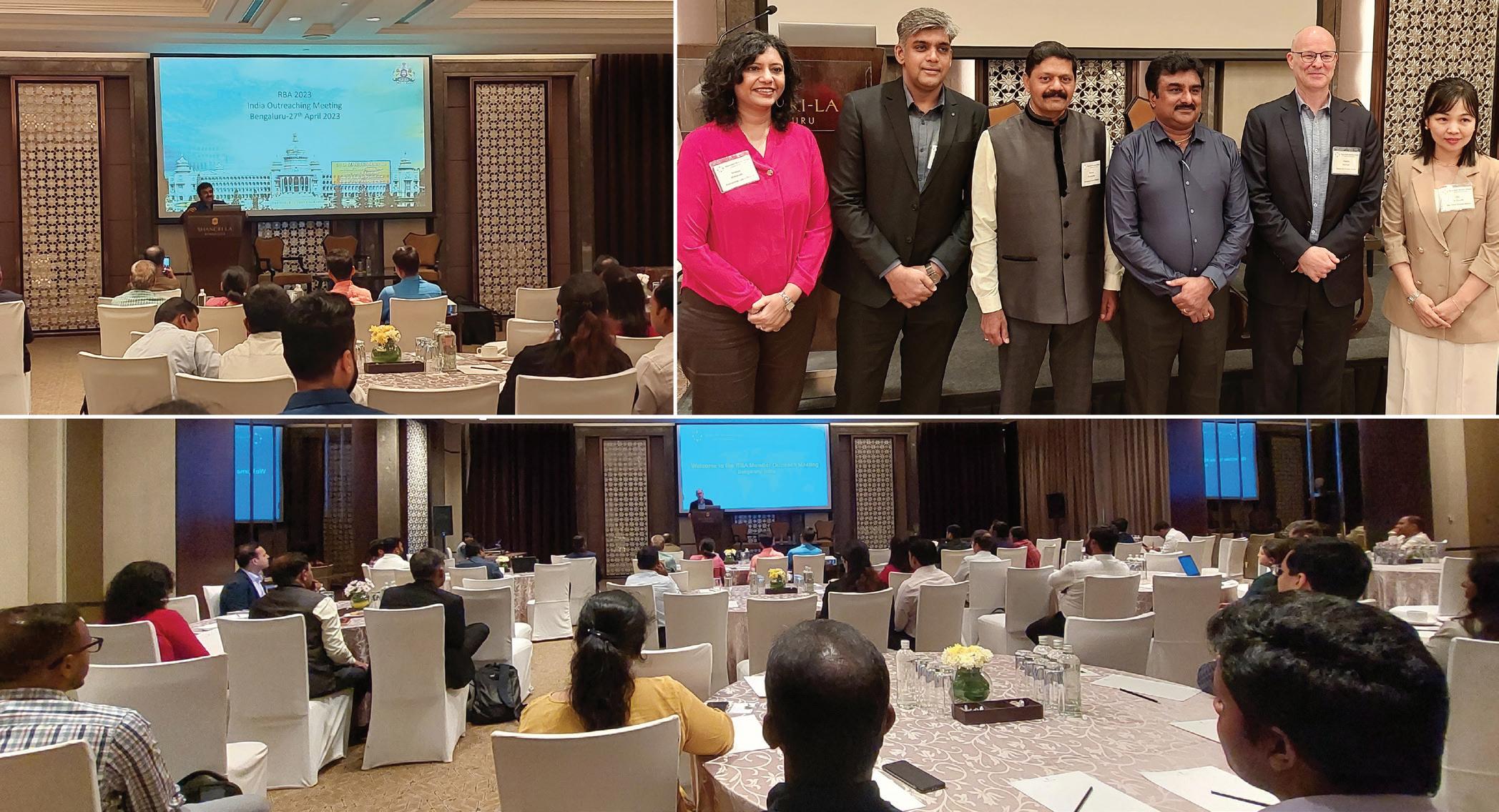




The RBA held an Outreach Meeting in Bengaluru, India on April 27, in partnership with IJM, to discuss global regulatory and policy developments impacting supply chains, building capacity to meet customer requirements, emergency preparedness, common issues and audit findings in India, and more. Dr Manjunath Gangadhara, Additional Labour Commissioner (Industrial Relations) Government of Karnataka, India, was the featured speaker.


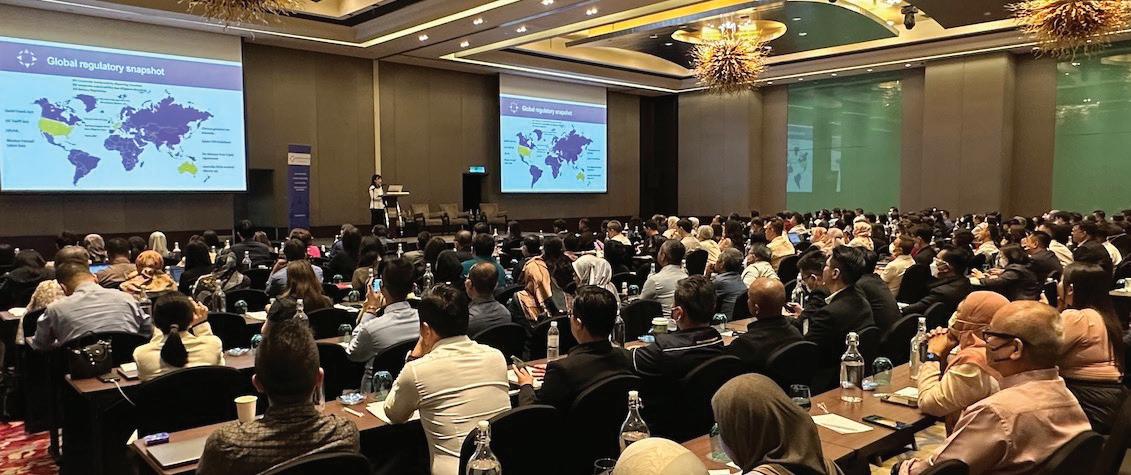
During the RBA Outreach Meeting in Kuala Lumpur, Malaysia on March 22, we discussed important issues including global regulatory and policy developments impacting supply chains, evolving expectations on and approaches to forced labor due diligence, common audit findings in Malaysia, and emissions management, as well as updates on the RBA and its initiatives.
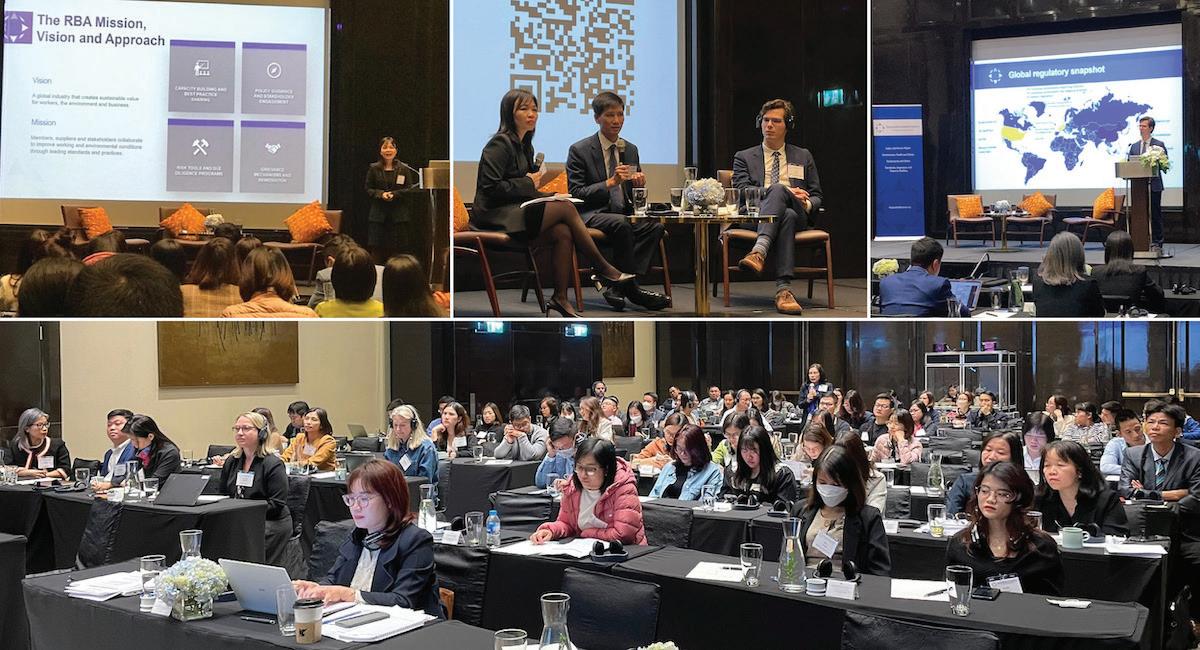

On March 2, the RBA held an Outreach Meeting in Hanoi, Vietnam focused on forced labor due diligence, GHG management, global regulatory and policy developments, common audit findings in Vietnam, and other important issues related to companies operating in the country.
On February 28, the RBA held an Outreach Meeting in Bangkok, Thailand focused on evolving expectations on and approaches to forced labor due diligence, global regulatory and policy developments, GHG management, updates on the RBA and its initiatives, and more.


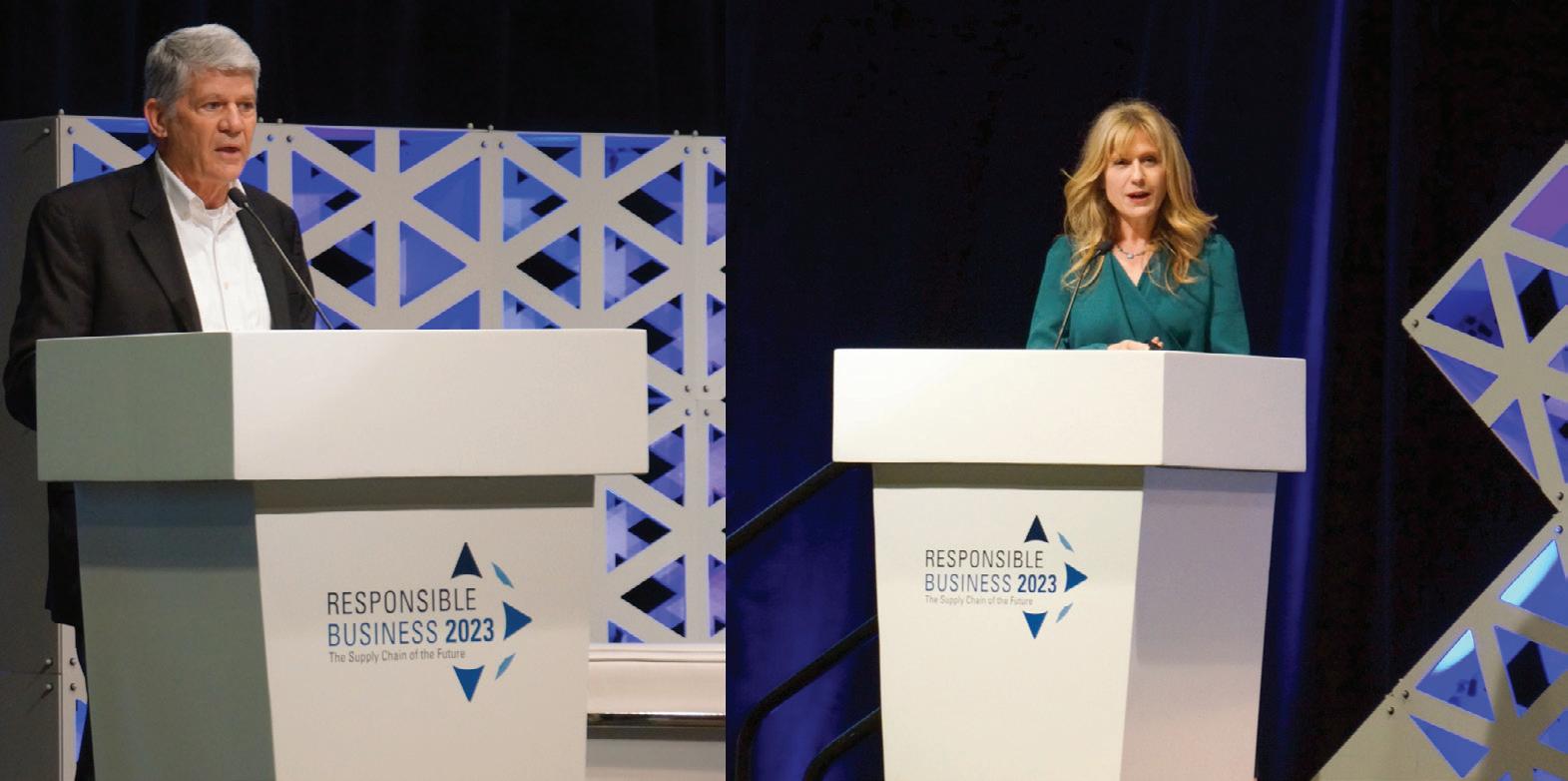









The RBA and RMI annual conference and member meetings, Responsible Business 2023, took place in Santa Clara, California and online October 16-19. Conference registration topped 800 for the first time, with more than 575 attending in person and more than 225 joining virtually.

























The RBA and RMI Members-Only Meetings were held on October 16. RBA CEO Rob Lederer and RMI Executive Director Jennifer Peyser welcomed members and Rob shared a video highlight reel organization's efforts on behalf of members in 2023.















A popular feature of the annual Member Meetings are the sessions with alternating roundtable discussions, where members get updates and provide feedback on multiple topics of their choosing.

The Annual Conference began on October 17 with opening remarks from RBA CEO Rob Lederer and RBA Board Chair Sue Slaughter. Both highlighted challenges and opportunities for the industry as well as the significant progress made by the RBA in recent years.

Executive Assistant Commissioner AnnMarie R. Highsmith, from the Office of Trade, U.S. Customs and Border Protection, delivered the conference keynote address and emphasized the importance of communication and collaboration among key stakeholders.
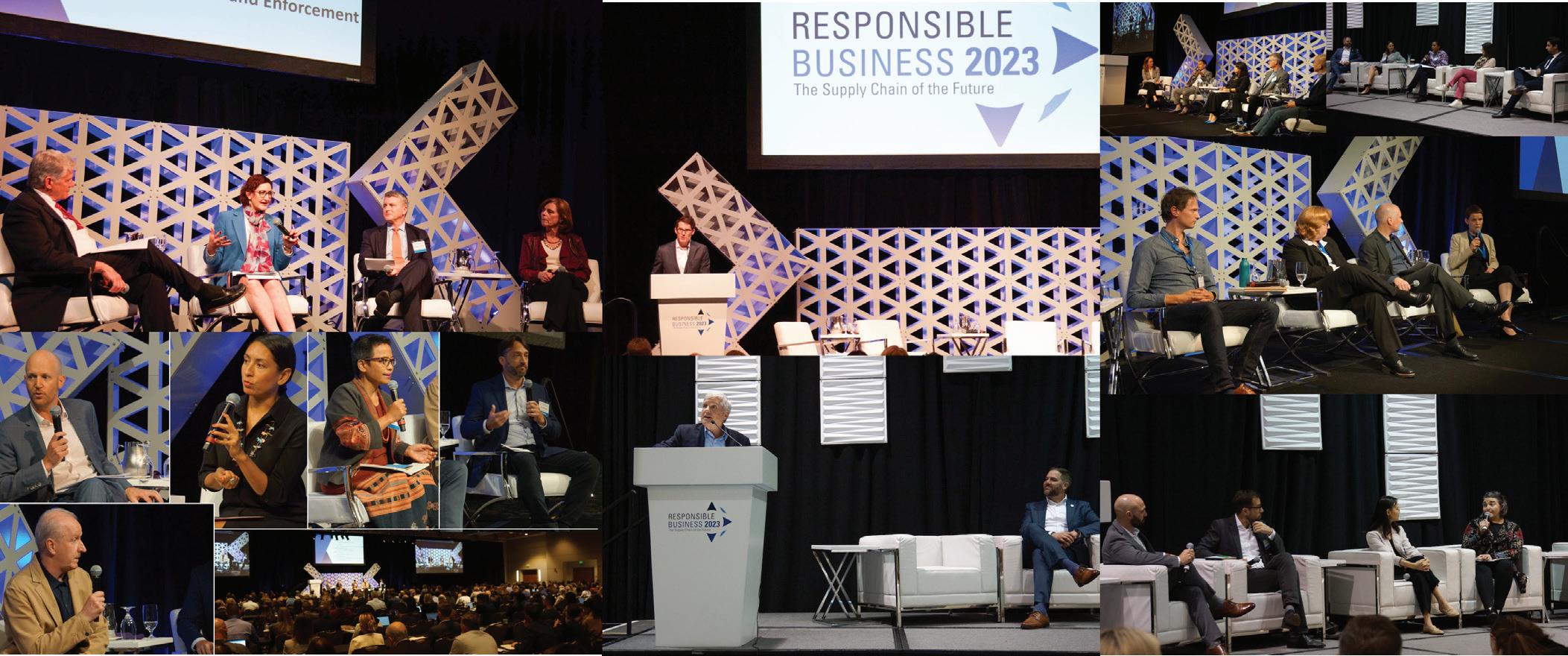
Numerous speakers and panels followed during the conference’s Human Rights and Environmental Summits, on topics including Just Transition, Forced Labor, Ethical Recruitment, Living Wage, Reducing Scope 3 Emissions, Environmental Impacts to Supply Chains, Chemical Management, and many more.







The next day, discussions focused on Impact at Scale, with breakout sessions on Artificial Intelligence, Supply Chain Mapping, Minerals Due Diligence, Emerging Raw Materials, Regulations and Enforcement, Worker Voice, Remedy, Inter-Initiative Alliances, Audit Transformation, Grievance Mechanisms, Battery Regulations, Responsible Purchasing, and many others.
During the first day of the RBA’s European Conference, on May 23 in Brussels, Belgium, members and their suppliers gained valuable insights on emerging trends and opportunities, recent public policy developments, and updates on key RBA initiatives, programs and tools.




























The panel on the Future of Industry Collaboration on Supply Chain Sustainability focused on how companies are addressing emerging issues. The panel was moderated by RBA CEO Rob Lederer and included executives from RBA member companies Ford Motor Company, BMW Group, and Amazon.























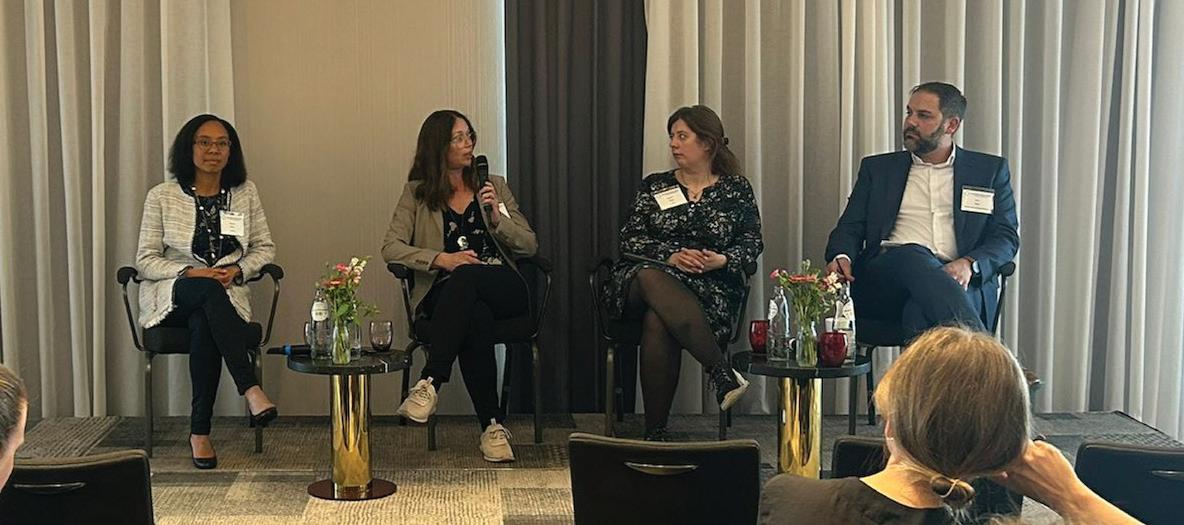
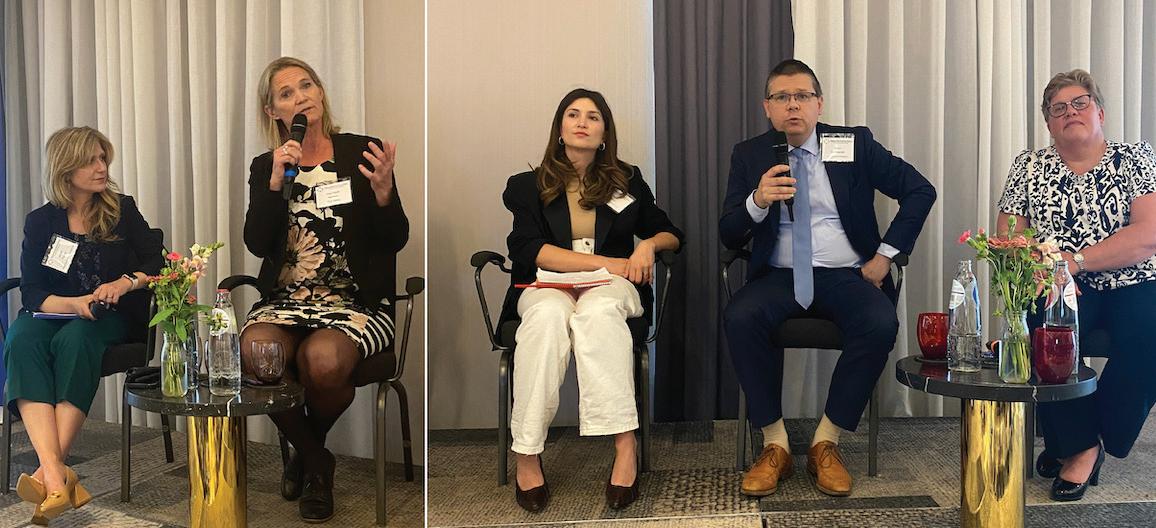
The second day of the conference began with a keynote from MEP Lara Wolters, Rapporteur on EU Corporate Sustainability Due Diligence Directive, European Parliament, followed by a panel of MEPs and other policymakers at the center of the design and implementation of emerging mandatory due diligence legislation, including the EU Corporate Sustainability Due Diligence Directive (EUCSDDD).
During the subsequent panel on Forced Labor, experts explored the building blocks of effective due diligence efforts, the latest trends in industry practices and current challenges. Panelists included representatives from the ILO, Members of the European Parliament, the European Commission’s DG Grow, and Anti-Slavery International.
Later, the panel on Climate Leadership in Supply Chains: The March Toward Net Zero addressed progress toward aggressive climate targets, regulatory and industry support. Panelists included representatives from RBA members Logitech, Dustin AB, and Easee.
The panel on Powering the Green Transition discussed how the EU Batteries Regulation and related developments are impacting industry due diligence efforts in the battery raw materials space. Panelists included representatives from the European Commission’s DG Grow, the European Federation for Transport and Environment, and RMI members FREYR Battery and Ford Motor Company.

The Responsible Glove Alliance (RGA), an initiative of the Responsible Business Alliance (RBA), is a focused effort on forced labor and ESG due diligence in the rubber glove industry. The RGA held its first annual conference, Responsible Glove 2023, in Kuala Lumpur, Malaysia on September 21 with notable speakers addressing a capacity crowd of more than 220 attendees on important, global regulatory and policy developments impacting rubber glove supply chains.
Discussions began with opening remarks by RBA CEO Rob Lederer, followed by keynote speaker YB Tuan Mustapha Sakmud, who is Malaysia’s Deputy Minister of Human Resources, and then remarks from the British High Commissioner to Malaysia, representatives from the U.S. Embassy in Malaysia, the Delegation of the EU to Malaysia, Malaysia’s Ministry of Home Affairs, and the European Parliament.
The RGA’s Executive Director spoke with Brian Hoxie, U.S. CBP Director, Forced Labor Division, about salient issues and enforcement, followed by leadership roundtable discussions on industry best practices with executives from RGA members Hartalega, Kossan Rubber Industries Bhd., YTY Group, Ansell Limited, Cardinal Health, and Henry Schein, Inc.












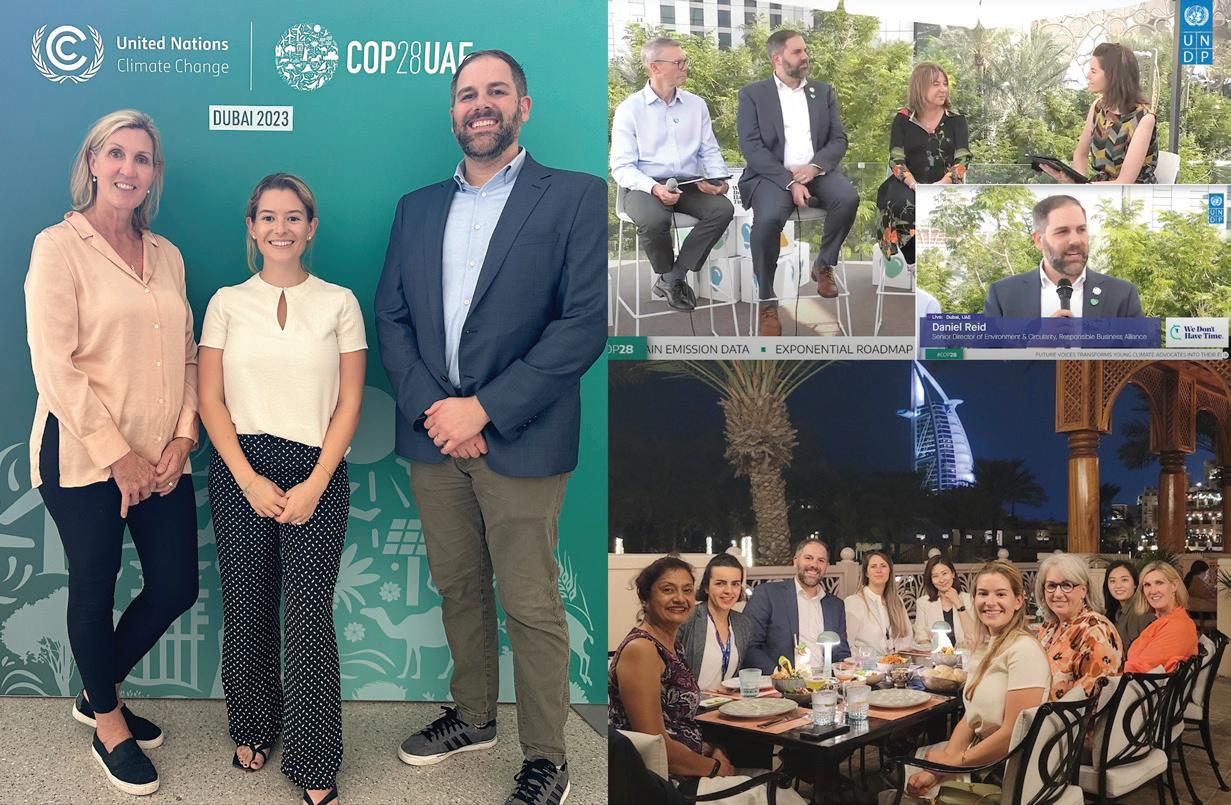


























The RBA's environment team attended the United Nations Climate Change Conference, COP28, in Dubai, UAE in December. As a recognized NGO Observer, the RBA was permitted in the COP Blue Zone where the team shared members’ experiences with key stakeholders and governments, speaking publicly on the need for greater supply chain collaboration, and highlighting the RBA Emissions Management Tool.









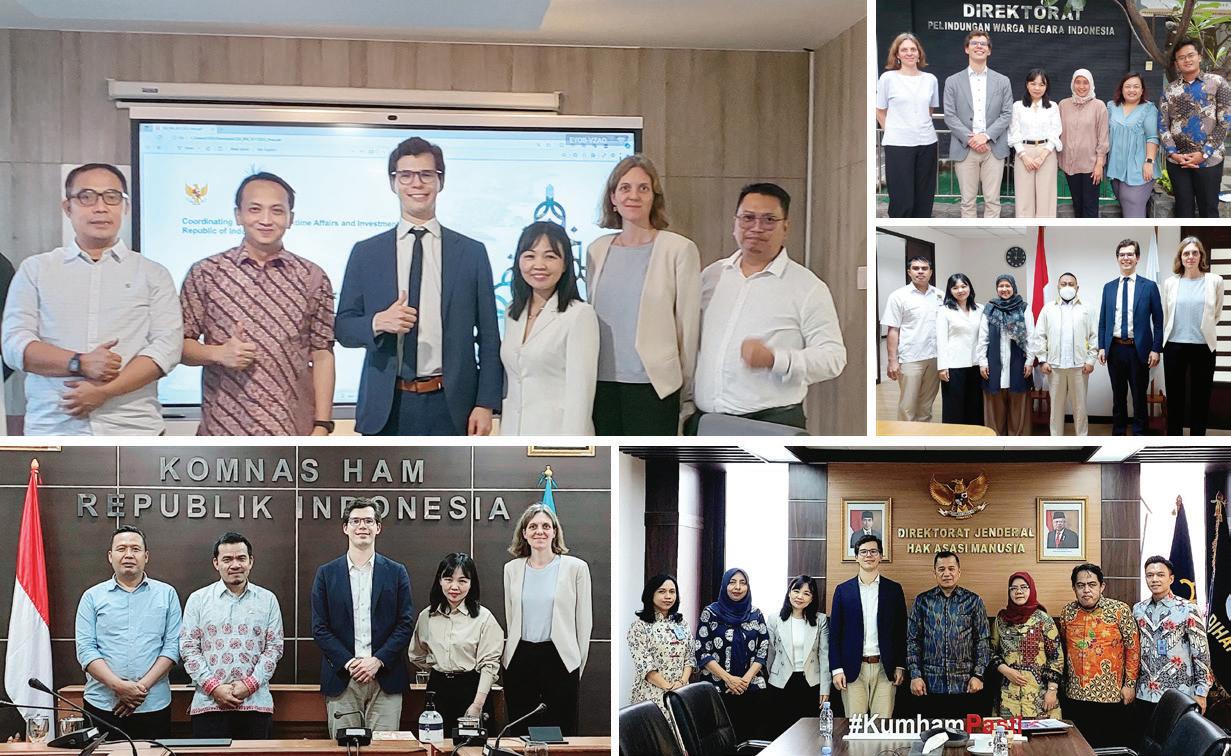



The RBA and its Responsible Minerals Initiative (RMI) met with six ministries and agencies of Indonesia during the first week of December, to gain insights into the government’s response to pending human rights due diligence regulations and discuss ESG and responsible sourcing practices, especially in relation to the EU battery regulation.

The RBA spoke at the annual UN Forum on Business and Human Rights in Geneva, Switzerland at the end of November. Discussions at the UN Forum highlighted responsible policy engagement, promoting transparency, and alignment with existing international due diligence standards.
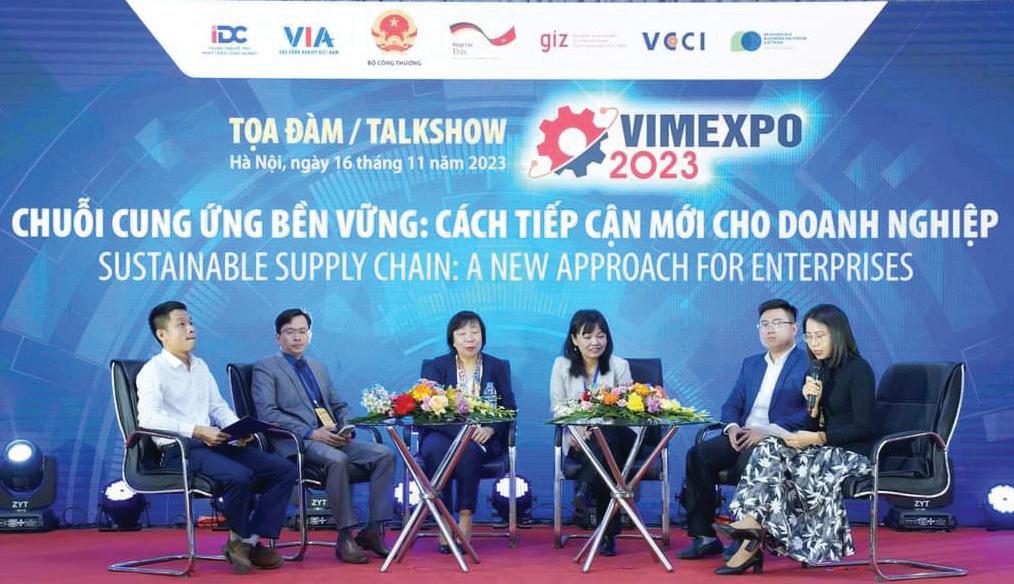
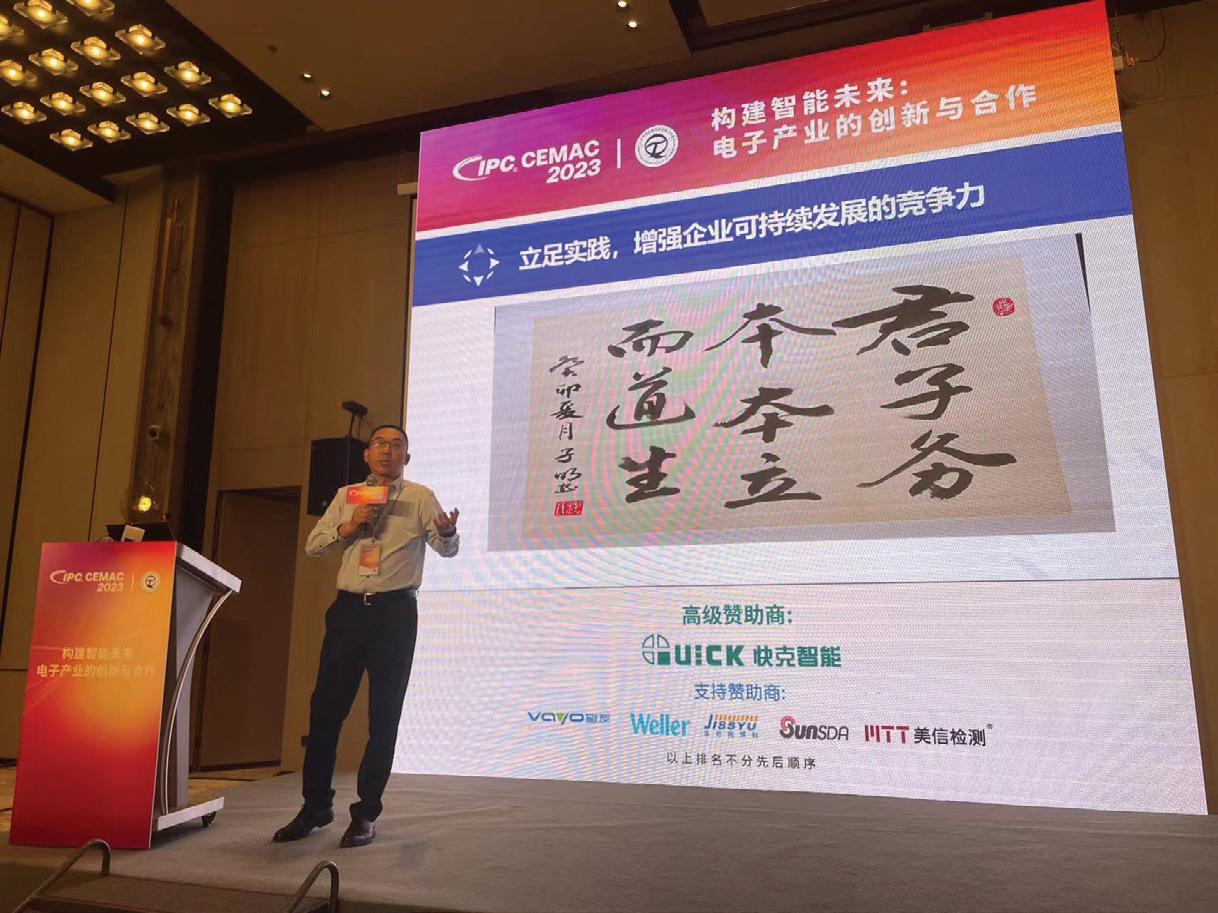
The RBA spoke at the Vietnam Export Exhibition (VIMEXPO) in Hanoi, an annual event held by the Ministry of Trade and Industry, which took place November 14-16. The RBA discussed its efforts to help prepare members' supply chains for mandatory human rights due diligence regulations and how such preparation can benefit the Vietnamese business community.
On October 27, the RBA spoke at the IPC China Electronics Manufacturing Annual Conference (CEMAC) in Shanghai, China. The theme was "Building an Intelligent Future: Innovation and Cooperation in the Electronics Industry." The RBA spoke about its Code of Conduct, key ESG requirements, and the many RBA tools for member companies and their suppliers to fulfill expanding regulatory requirements and build sustainable development.

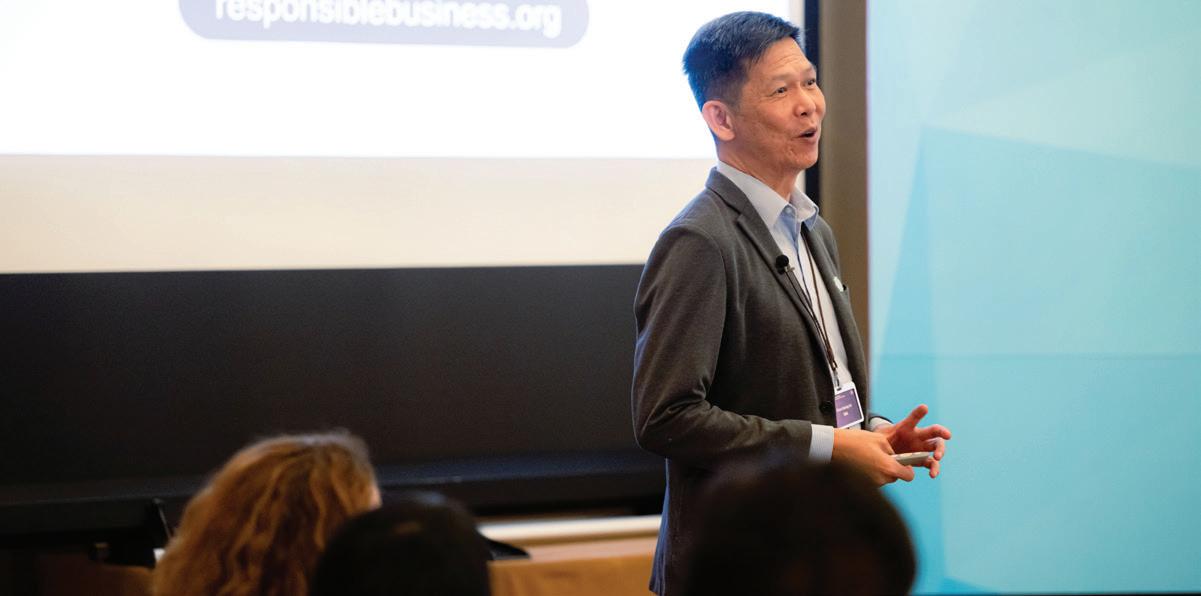
The RBA spoke at the 2023 International Forum on Sustainable Mineral Supply Chains in Chengdu, China, September 20-22, organized by China Chamber of Commerce for Import & Export of Minerals and Chemicals (CCCMC) and the Responsible Critical Mineral Initiative (RCI). The RBA emphasized the desire to scale up credible due diligence quickly across a wide range of metals with collaboration and cooperation between initiatives.
On September 5, the RBA participated in a panel at member Philip Morris International’s Sustainability Day for Electronics Suppliers. Discussions included case studies and other insights shared by sustainability experts. The RBA emphasized that sustainability cannot be achieved without active engagement of suppliers.

The RBA participated in an IOM regional roundtable in Bangkok, Thailand in August on access to remedy for migrant workers. The RBA spoke about its work in supporting access to effective remedy for migrant workers, as well as its RBA Voices platform and grievance mechanism.
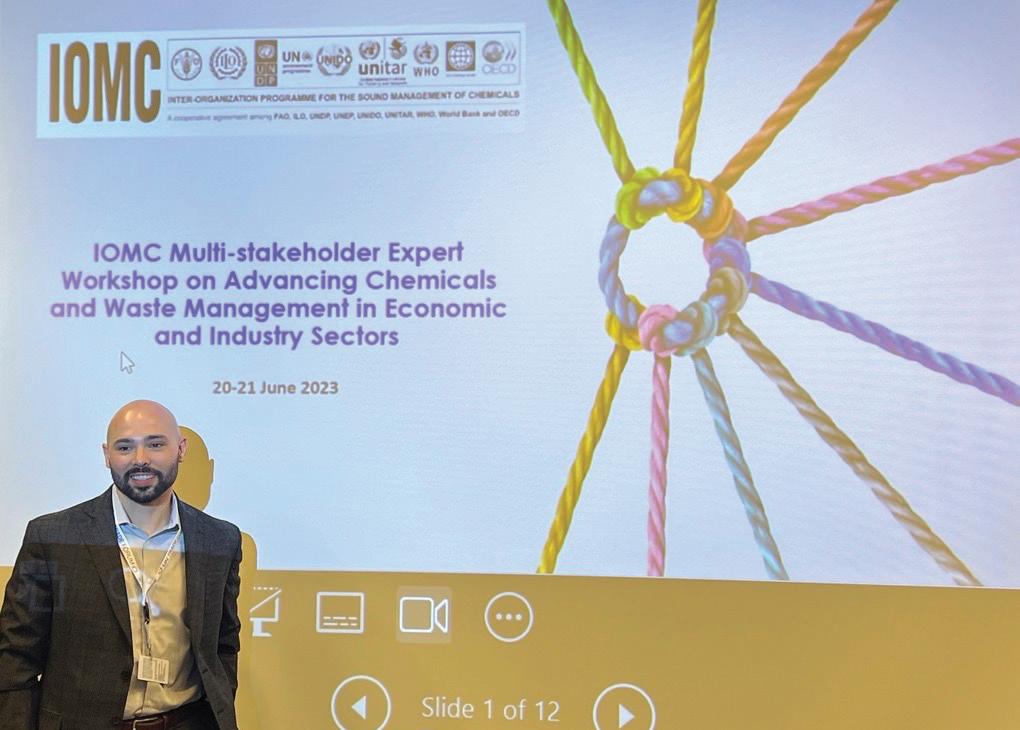

RBA staff and members participated in the InterOrganization Program for the Sound Management of Chemicals’ (IOMC’s) multi-stakeholder expert workshop in Geneva, Switzerland, in mid-June. Discussion topics included advancing chemicals and waste management in economic and industry sectors.
The RBA's Responsible Minerals Initiative attended DRC Mining Week in Lubumbashi, Democratic Republic of the Congo and met with representatives of the technical committee from the DRC Ministry of Mines and other stakeholders to discuss next steps for the ASM Cobalt Framework. The RMI later joined a delegation for site visits to industrial and artisanal cobalt mining sites in the Lualaba province.
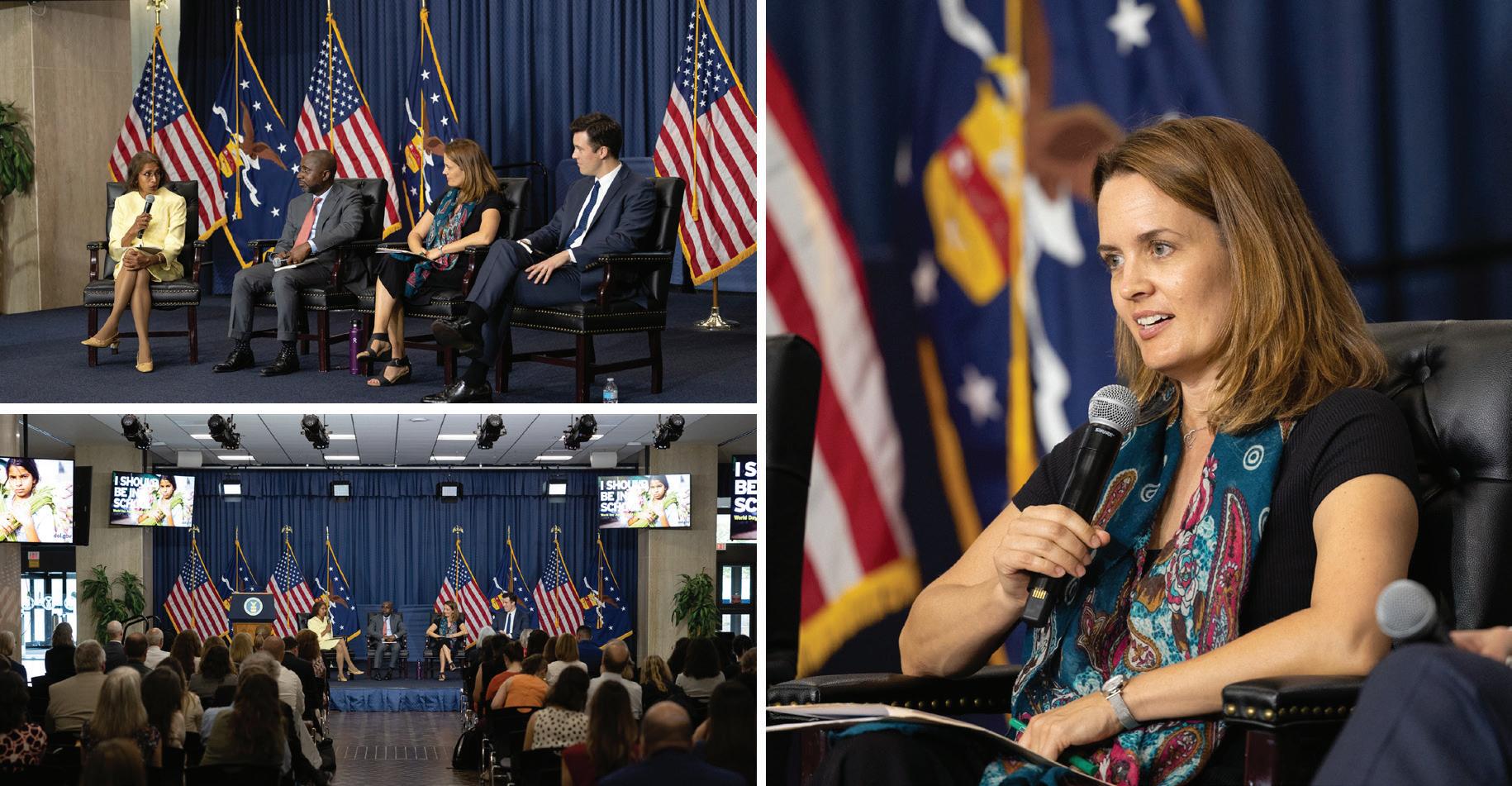
The RBA participated in the U.S. Department of Labor’s ILAB event on World Day Against Child Labor, in Washington, D.C. on June 12, to share best practices on forced and child labor due diligence efforts in the private sector and discuss what more needs to be done to protect children across the globe.
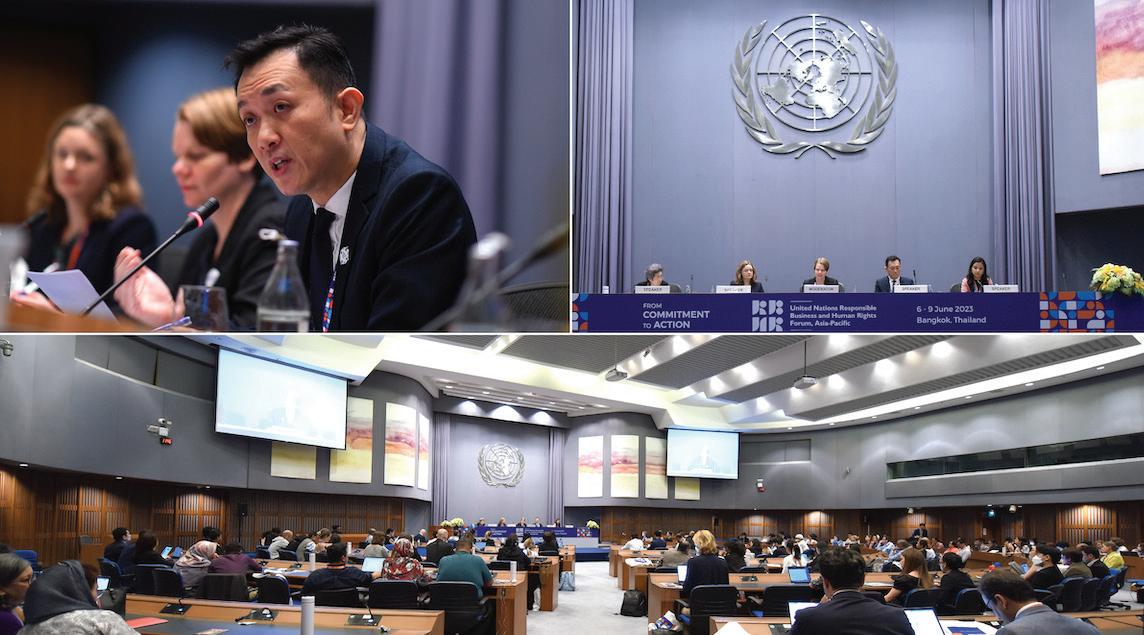
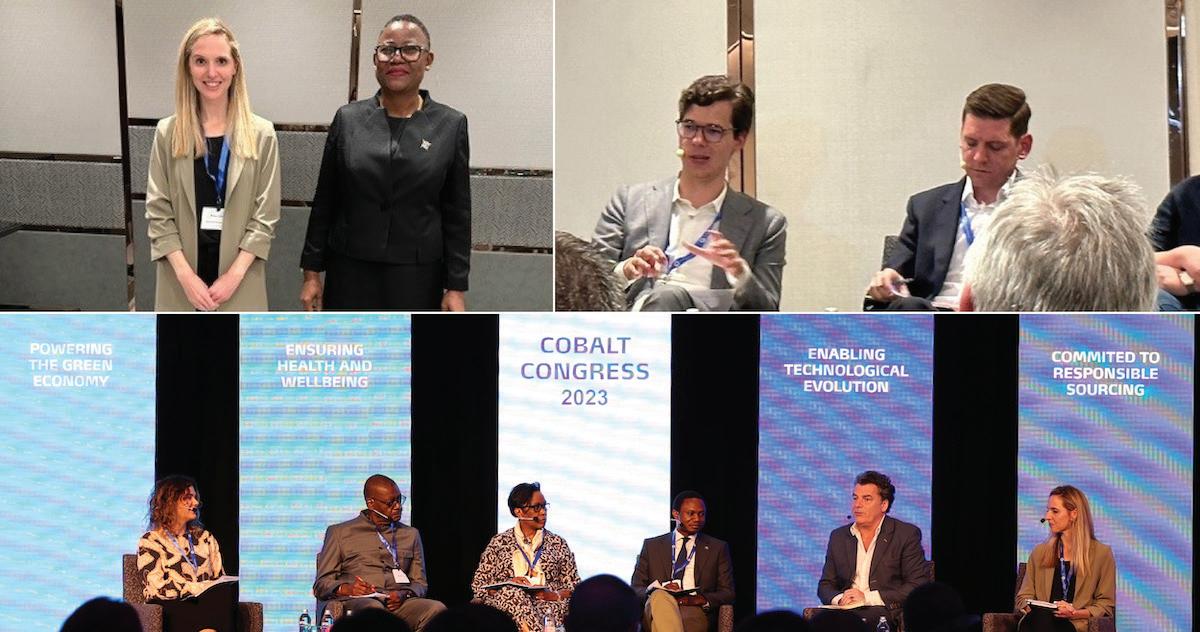

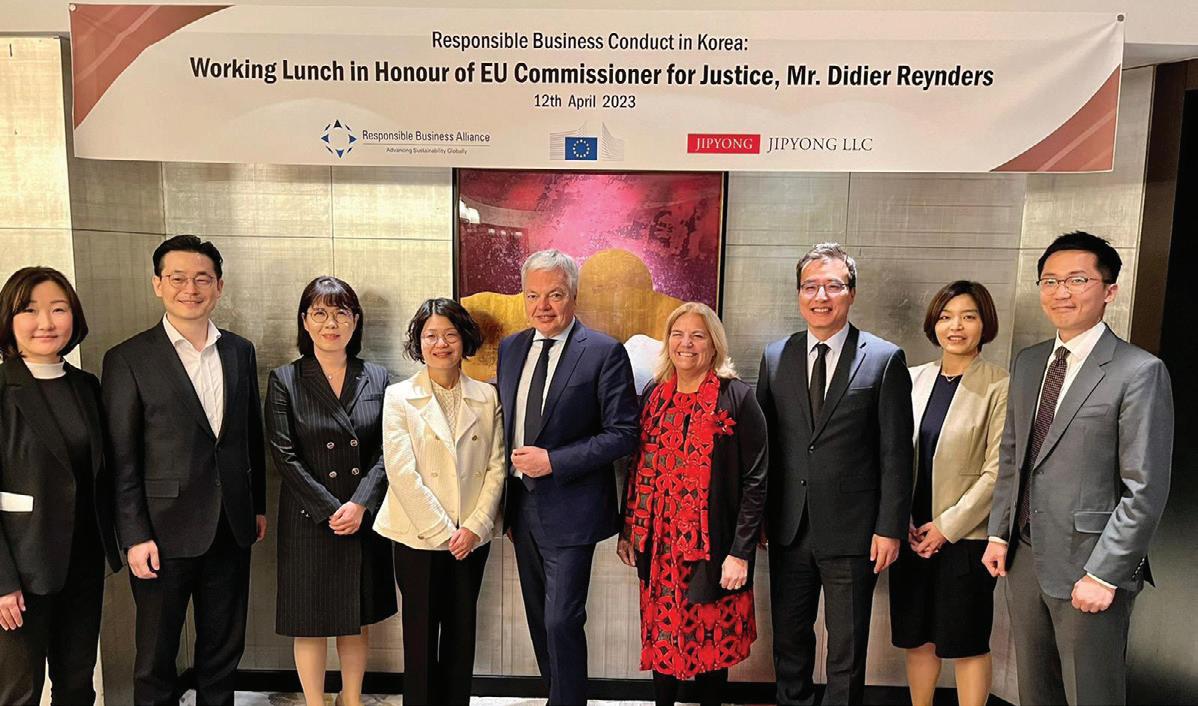
The RBA spoke at the IOM plenary session during the UN Business and Human Rights Forum, Asia-Pacific on June 7, about the unique challenges faced by migrant workers and how the RBA and its Responsible Labor Initiative (RLI) engage stakeholders to ensure that working conditions in supply chains are safe, that workers are treated with respect and dignity, and that business operations are environmentally responsible and conducted ethically.
The RBA and its Responsible Minerals Initiative (RMI) attended the Cobalt Congress in Istanbul, Turkey, May 9-11. The RMI presented on efforts to promote a transparent and verifiable cobalt supply chain, while the RBA presented on emerging regulations affecting environmental due diligence.
The RBA’s Responsible Minerals Initiative (RMI) and session partners hosted insightful discussions at the OECD Forum on Responsible Mineral Supply Chains in Paris, France, April 24-28. Topics included formalizing artisanal and small-scale cobalt mining, improving supply chain traceability, achieving more impactful outcomes from policy approaches to mineral supply chain corruption, and sustainability in the EU battery regulation.
On April 12, the RBA and Jipyong LLC cohosted an event in Seoul, Korea featuring EU Commissioner Didier Reynders, members of his cabinet, representatives from the EU delegation and RBA member companies. The event focused on responsible business conduct and the state of current sustainability due diligence practices by leading Korean companies, as well as the EU Corporate Sustainability Due Diligence Directive.

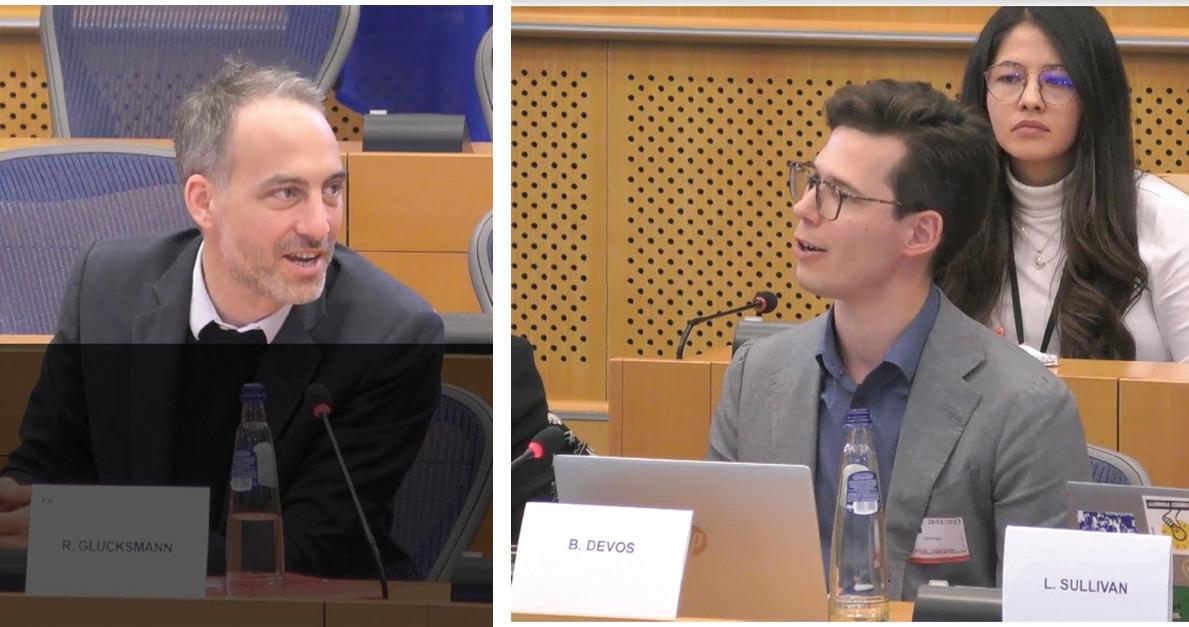

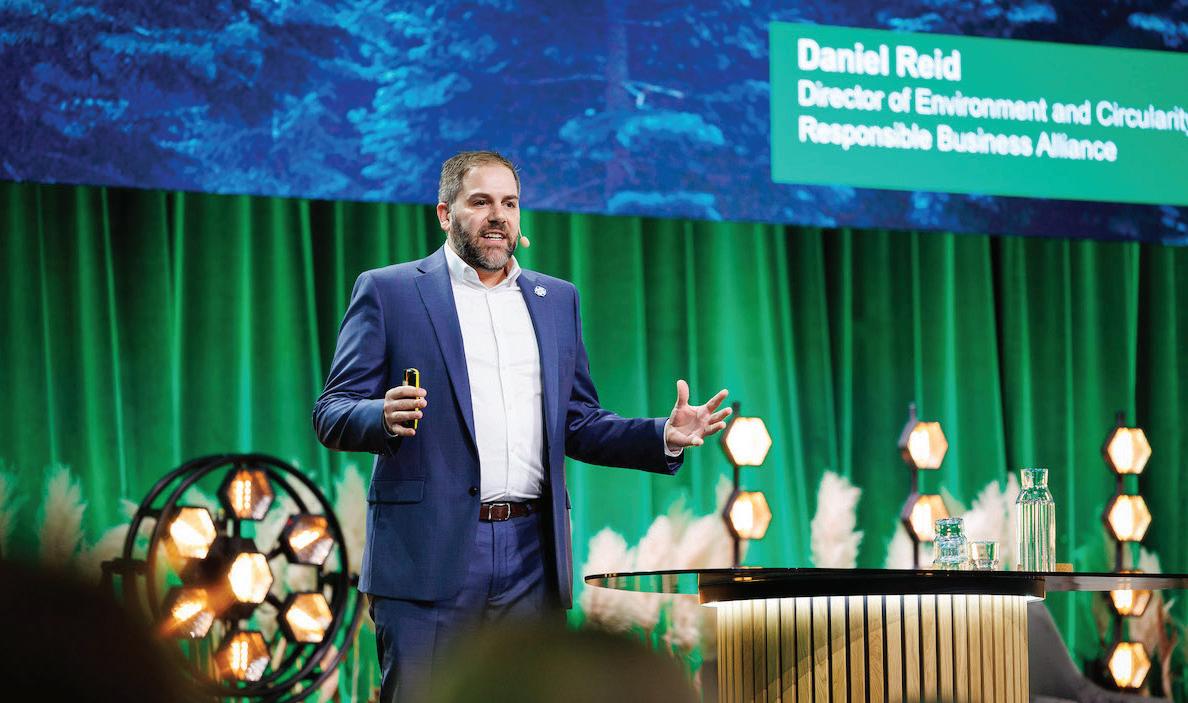
The RBA attended a bilateral meeting with Brian D. McFeeters, U.S. Ambassador to Malaysia, in Kuala Lumpur on March 27. The RBA and the ambassador exchanged views on a wide range of issues including human trafficking, forced labor and emerging global regulations on due diligence in supply chains and expected impacts.
The RBA spoke at a European Parliament conference on forced labor, at the end of March, alongside MEPs, civil society, industry and other experts. This event marked the start of European Parliament committee's work on the proposed EU Forced Labor Regulation.
The RBA hosted a meeting for members of the RBA Southeast Asia Network in Kuala Lumpur, Malaysia, adjacent to the RBA Outreach Meeting in March. Sixteen participants from 11 RBA member companies based in Malaysia and Singapore met with RBA staff to discuss membership, training, and regional topics of interest.
The RBA spoke at the Atea Sustainability Forum 2023 on March 21, where the theme was accountability and transparency for the IT sector. The RBA presented its tools, programs and due diligence standards, which help enable companies to be transparent and hold their supply chains accountable.

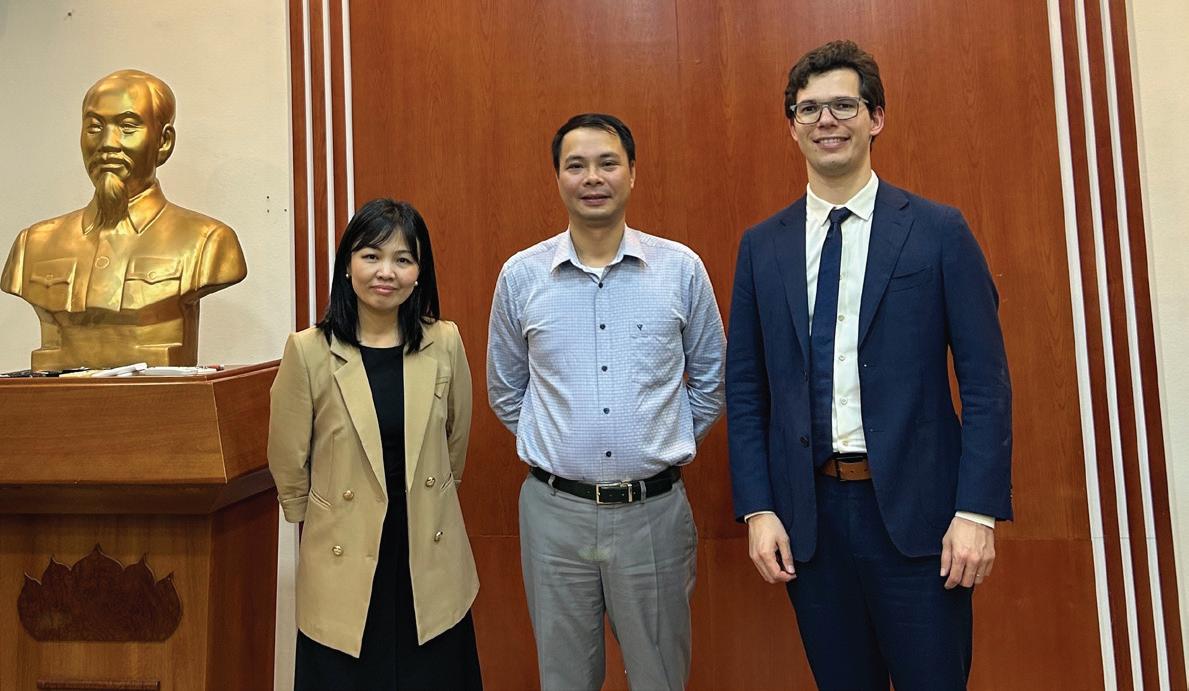
The RBA spoke at the AmCham EU plenary meeting, on March 28, dedicated to Responsible Business Conduct. The RBA presented its role in enabling member companies to conduct supply chain due diligence effectively and efficiently, and in aligning members' practices with emerging regulatory requirements.
The RBA met with the Director General of the Vietnam Ministry of Industry and Trade’s Vietnam Industry Agency in Hanoi in March to discuss collaboration efforts and the industry’s readiness for the impacts of emerging regulations related to supply chain sustainability.
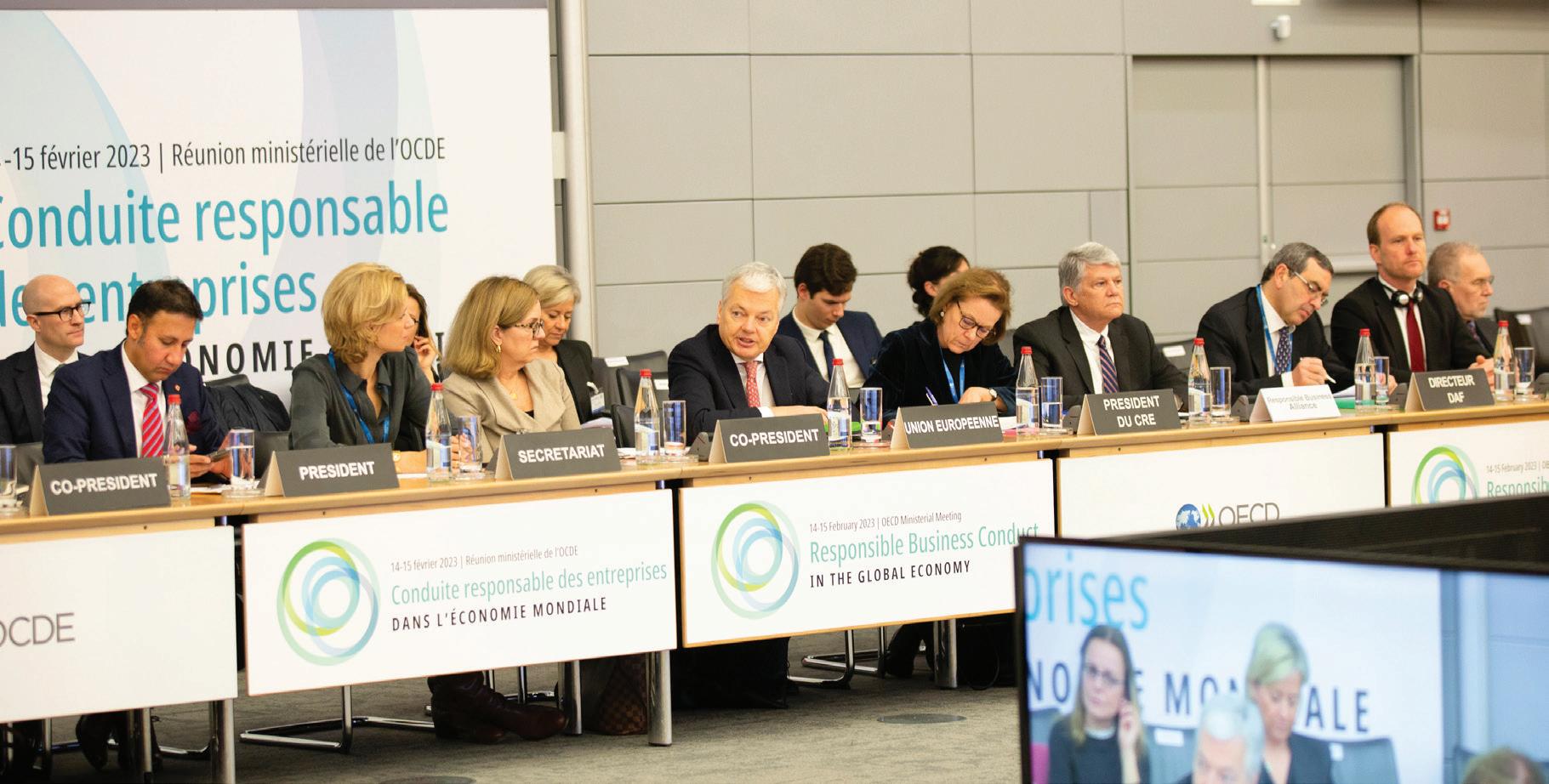
The RBA was a key expert speaker at the OECD Ministerial Meeting on Responsible Business Conduct in the Global Economy, which took place in Paris, France, February 14-15. Ministers from more than 50 countries discussed the future of the OECD's work in Responsible Business Conduct. The RBA emphasized the importance of the OECD MNE Guidelines and their role in streamlining government and industry efforts.
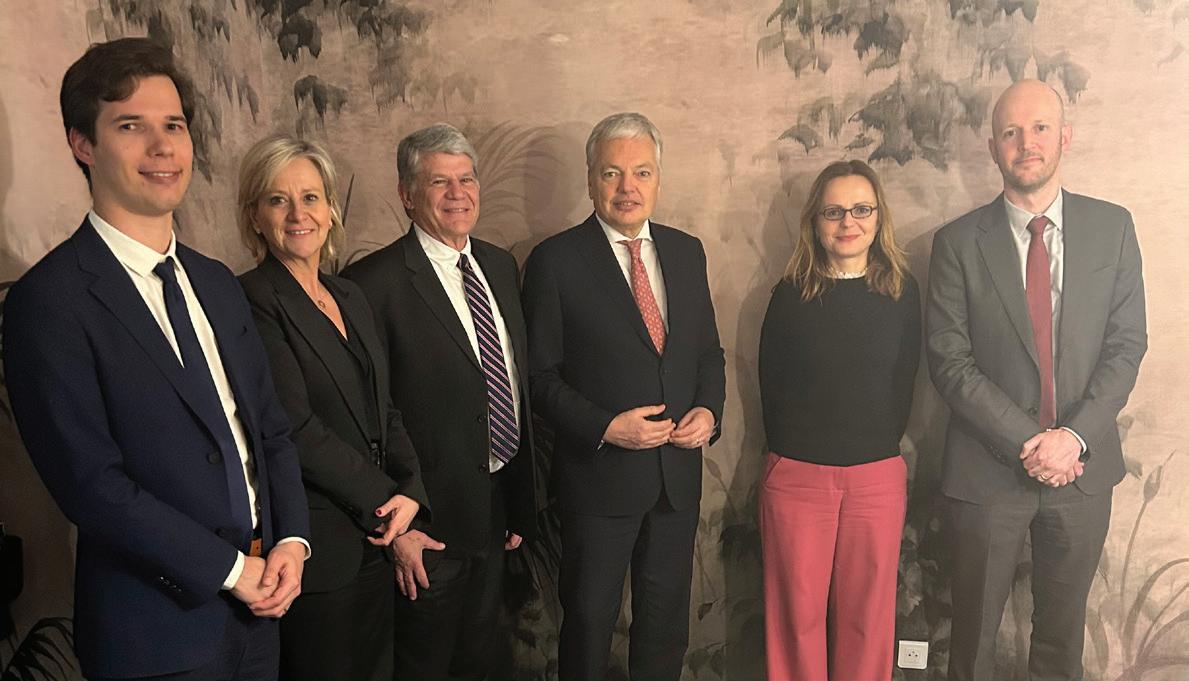

The RBA met with EU Commissioner Didier Reynders in Europe in February to discuss the EU Corporate Sustainability Due Diligence Directive and industry priorities, including regulatory harmonization, aligning with existing standards such as the OECD Guidelines, and encouraging industry collaboration.
The RBA delivered a virtual address at the China Electronics Standardization Association's annual conference on February 10. The RBA spoke about global regulatory trends and technological solutions that can bridge the gap between policy and practice for effective due diligence in global supply chains.
























In 2023, the RBA Data Analytics team continued to work diligently on enhancing the organization's performance in data management with its online sustainability data management system, RBA-Online.







The team added a number of enhancements and new member tools, such as analysis and benchmarking of Facility Risk SAQs, the Emissions Management Tool, and an all-new Supplier Scorecard. During the year, the team also helped more than a dozen member companies leverage the RBA data application programming interfaces (APIs) to further enhance their data capabilities. The team also continued to field requests from RBA and RMI members for custom analytics and tailored data sets to help them solve their most challenging supply chain issues.





View the RBA-Online video
Visit the RBA-Online webpage


















These issues can be generally categorized into four areas: Labor and Human Rights, Health and Safety, Environment, and Governance and Ethics. While all of these issues are important, some were more relevant to RBA members’ supply chains in 2023 and thus more of a focus than others.
In the sensing maps that follow, the further to the right an issue is, the more important it is to our members and the higher it is, the more important it is to stakeholders. For the purposes of this study, we are most interested in identifying issues that are in, or are moving toward, the upper-right quadrant because those are most important to members and stakeholders.
Climate Change, which was the fifth-highest rated issue in 2019 and the second-highest rated issue in 2021, was the top-rated issue overall in 2023. Forced Labor and Human Trafficking, which was the top-rated issue in the previous five sensing studies, moved to third place in 2023 but still remained very high on the sensing map. Responsible Sourcing of Raw Materials and Conflict Minerals, which was previously broken out as two separate issues that placed third and fourth in 2021, rose to second place in 2023. Supply Chain Resilience, which was added to the list of issues in 2021, rose from the fifth to the fourth position in 2023. Nondiscrimination, which first entered the upper-right quadrant of the sensing map in 2021, made the topfive list for the first time.














The RBA has been conducting and refining its sensing assessment exercise since 2014. The study, which is conducted every two years, consists of quantitative and qualitative inputs to measure the importance/relevance of 32 issues to companies and stakeholders.








2023


in descending order


1. Climate Change





2. Responsible Sourcing of Raw Materials and Conflict Minerals
3. Forced Labor and Human Trafficking


4. Supply Chain Resilience
5. Nondiscrimination
2021



1. Forced Labor and Human Trafficking
2. Climate Change
3. Ethical Sourcing of Raw Materials
4. Conflict Minerals
5. Supply Chain Resilience
The issues that moved the most in a positive direction (upward and/or to the right) on the sensing map in 2023 were: Supply Chain Resilience, Transparency and Reporting, and Advanced Manufacturing and Automation. The issues that moved the most in a negative direction (downward and/or to the left) on the sensing map in 2023 were: Temporary or Short-Term Labor, Young (Student) Workers, and Child Labor.
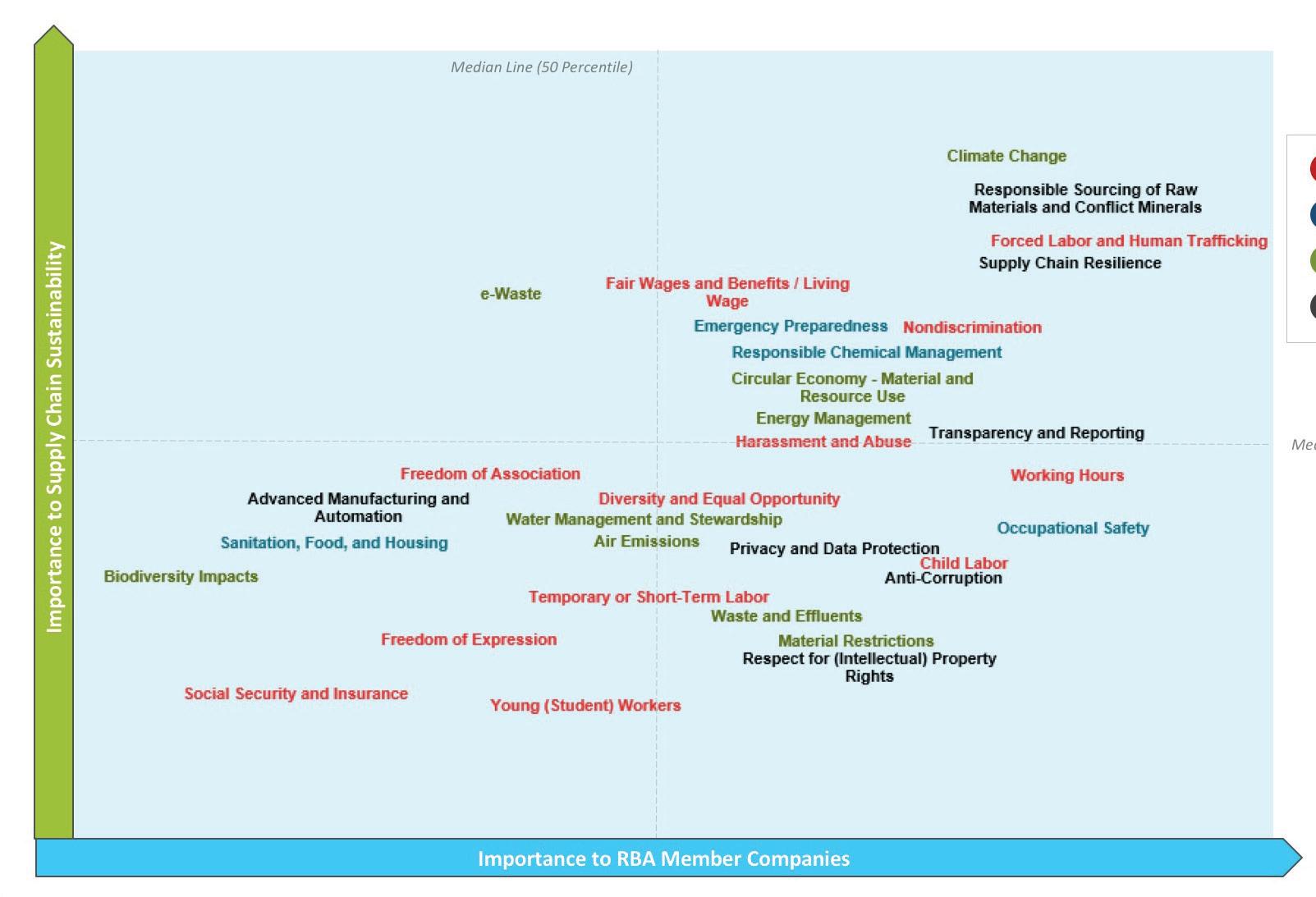
n Labor and Human Rights n Health and Safety n Environment n Governance and Ethics

n Labor and Human Rights n Health and Safety n Environment n Governance and Ethics










For this update, an improved process was introduced to streamline member and stakeholder input and standardize how the input was reviewed and integrated. The submission process was open to all stakeholders, including non-governmental organizations, academia, governments, and all levels of RBA membership.
At the end of the input submission period, the consolidation process, and the 30-day member discussion period, 34 proposals for material changes moved forward to a vote. Twenty-four proposals, which included at least one change per section of the Code of Conduct, passed as a result of the vote. These changes represented further alignment with international standards, as well as existing and emerging due diligence regulations around the world, and greater clarity on existing Code language.
Notable changes to the RBA Code of Conduct included:
• Payment of overtime premium, regardless of the local law
• Equal pay for equal work and qualification
• Reasonable accommodations for disability
• Respect for the right of freedom of association and collective bargaining in all cases
• Workers’ right to remove themselves from imminent harm
• Absolute corporate-wide GHG reduction goals
• Tracking, documenting and reporting on significant categories of Scope 3 GHG emissions
• Ongoing two-way communication with workers, their representatives, and other stakeholders as relevant and necessary










The RBA successfully completed another triennial update of its Code of Conduct in 2023. More than 70 percent of the proposed changes were approved by member vote and incorporated into version 8.0.
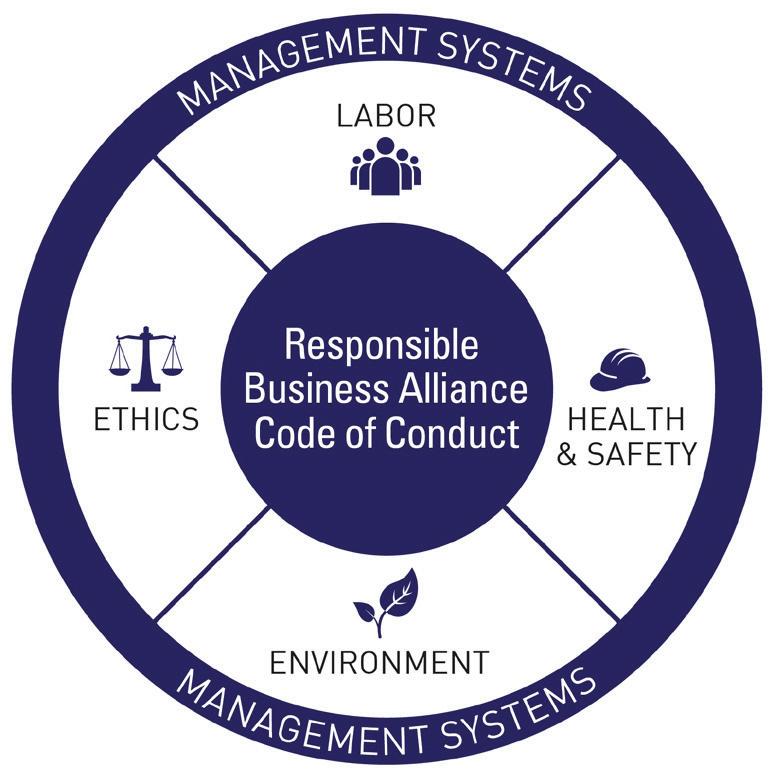









As part of the standard Code revision process, the Validated Assessment Program (VAP) was subsequently updated to reflect these changes. Due to the significant impact of some of the new Code requirements, the RBA implemented a corresponding due diligence approach to support members and auditees. The due diligence approach allows auditees to receive an Opportunity for Improvement (OFI) rather than a severity rating for the new Code of Conduct 8.0 elements. This gradual implementation is valid until July 2024. The approach enables the auditees to understand the gaps at their facilities without the assessment-related consequences, and gives them the time and resources to improve their conditions until their Closure Assessments. If a Closure Assessment is not conducted within 12 months of the assessment report release date, findings are subject to be reversed and scores changed to reflect the Non-Conformance.
The RBA Code of Conduct 8.0 went into effect on January 1, 2024, and is available in 28 languages or dialects on the RBA website.
the Code of Conduct webpage











The Validated Assessment Program (VAP) continues to be the leading standard for onsite compliance verification and effective, shareable assessments conducted by independent, third-party firms. The VAP has experienced a consistent 20 percent annual growth rate and, since 2020, there has been a marked increase of 60 percent in the number of countries where RBA assessments are conducted.
In 2023, the RBA granted approval to six more firms to conduct VAP assessments, prioritizing countries experiencing heightened demand. For example, demand in Japan increased by 32 percent, in Europe it increased by 25 percent, and in Mexico and the U.S. it increased by 13 percent.
The RBA has made substantial enhancements to data analytics services for its members, including facility-specific data and global supply chain statistics. These enhancements include the introduction of an updated member dashboard and assessment report (VAR) analytics. Specifically addressing forced labor, the RBA has introduced an updated assessment report that maps nonconformances to the ILO's forced labor indicators. Additionally, in 2023, a new specialty assessment focusing on chemical management was introduced, with full deployment anticipated in 2024.
Visit the VAP webpage































n Closure Assessments
n Initial Assessments
n Closure Assessments
n Initial Assessments































The total number of VAP and SVAP assessments conducted increased from 1,626 in 2022 to 1,957 in 2023 and average closure assessment scores increased slightly year over year.



In 2023, factories in China continued to represent the majority (44 percent) of all assessments conducted, with the next highest percentages of assessments conducted in Chinese Taipei (8 percent), Malaysia (6 percent), Japan and Thailand (5 percent each), and India, Mexico and Vietnam (4 percent each).


Other (34 sections below)















































































































In 2023, China had the highest number of average working hours per week (53.6), followed by Cambodia (52.7), Laos (52.0), Vietnam (50.2), and Thailand (49.5).
On average, workers in RBA member facilities work 4.9 fewer hours per week than their counterparts in nonmember facilities.

















As the RBA grows, so does its influence and the collective leverage of its members. That is why we are proud to say the RBA has had consistently strong membership growth since its inception, and record growth in the last several years. The RBA and its initiatives ended 2023 with a total of 594 members, up from 522 in 2022. The total number of core RBA members (not counting the initiatives) was 247 at the end of 2023, up from 225 in 2022. The chart below displays the distribution of core RBA members’ headquarters in 2023.




































FY 2023 Operating Revenue
$29,200,000
FY 2023 Operating Expenses $28,200,000
*The RBA ‘s fiscal year runs from January 1 through December 31.
















































Board of Directors 2023

Sue Slaughter
RBA Board Chair, and Global Director, Supply Base Sustainability, Ford Motor Company
Anna Meegan



Ashley Orbach


Susan Moore
Head of Sustainability, Google Hardware, Google

Thomas Cetta


RBA Board Vice Chair, and Corporate Vice President, Corporate Responsibility & Government Affairs, AMD
Senior Vice President & Chief Compliance Officer, Jabil
Kristofer Clark




Head of Supply Chain Assurance, Dell Technologies
Joel Eurich
Vice President, Global Compliance and EH&S, Molex

Ted Jeffries
Senior Director, Supply Chain Responsibility, Intel Corporation
Eric-Paul Schat



Director, Environment and Supply Chain Innovation, Apple Inc.

Mitsu Shippee




Senior Director, Sustainability, Environmental Health & Safety, NXP Semiconductors






Laurie Webb

Senior General Manager, Head of Sustainability Dept., Sony Group Corporation

Vice President, Legal and Chief Compliance Officer, Seagate Technology














Rob Lederer
Chief Executive Officer
Deborah Albers Chief Operations Officer
Tyler Gillard Chief Strategy Officer
Jennifer Peyser
Senior Vice President, Responsible Sourcing
Holly Evans Senior Vice President, Environmental Policy and Legal Affairs
Kenneth Anderson Vice President of Member Experience
Bart Devos
Vice President of Public Policy
Jarrett Bens Senior Director of Communications
Jack Cutts
Senior Director of Data Analytics
Marianna Smirnova Senior Director, RMI Standards and Training
Fabiana Di Lorenzo, Ph.D. Senior Director, RMI Impact and Innovation
Juan Carlos Martinez Senior Director of Operations
Bobby Terrell Senior Director of IT Operations
Chee Keong Lai Senior Director, Advisory Services
Laura Landrau Director of Events and Internal Operations
Benjamyn Marks Director of Environment, Health & Safety
Chi Q. Do, Ph.D. Director of Asia Public Policy
James Gyenes Director of U.S. Public Policy
Gregory Levitan Global Director of Human Resources
Ka Ea Lim Director, Compliance
Khai Yau Chua Director of Labor Programs
Andy Chiu Director of Operations - Assurance
Yakut Oktay Director of Operations - Automotive
Sandra Carvalho Director of Operations - Minerals
Josue Ruiz RMI Director of Facility Engagement
Anna Stancher Senior Program Manager, RMI
Mann Chyun Sim Senior Account Manager
Ross Landis Database Project Manager
Surya Herny Mahdzir VAP Program Manager
Mariana Osuna VAP Program Manager
Gavin Wu Manager of RMI Member Services
Diana Trigo Manager, RMI Training
Dana Battistello Manager, IT Projects
Kyle Rand Systems Administration Manager
Ronnie Tan
Asia Compliance Manager
Maggie Gabos RMI Technical Manager
Olena Stanislavchuk Assessment Program Manager
Jordan Davis Program Manager, Environment
Sarah Kildall Membership Manager
Whitney Chan Quality Assurance Manager
Tauqueer Alam Quality Assurance Manager
Zoul Pio IT Service Manager
Adriana Escobar Events and Membership Coordinator
Charles Teh VAP Project Coordinator
Montserrat Vega Assessment Program Coordinator
Mike McDonnell Senior Consultant
Charlotte Atkinson Chief Financial Officer
Anastasiia Olvera Controller
Malcolm Boardley Senior Accountant
Mohsen Mousavi Senior Accountant
Alexis Holmes Accounting Clerk
AS OF MAY 2024


AcBel Polytech Inc. - R
Acer Inc. - R
Advanced Micro Devices - F
Advanced Micro-Fabrication Equipment Inc. China
Advania AB - R
Allegro MicroSystems
Alphabet Inc. - R
Altria Client Services LLC
Amazon.com, Inc. - R
Amkor Technology, Inc. - F
Amphenol Corporation ams OSRAM
Analog Devices, Inc. - R
Apple Inc. - F
Applied Materials - R
Arista Networks, Inc. - R
ARRIS Group - F
Arrow Electronics
ASE Technology Holding Co., Ltd.
ASM International - F
ASML Holding - R
ASUSTeK Computer Inc. - F
Atea ASA - R
Avaya
Belden
Best Buy - F
Beyondsoft International (Singapore) PTE LTD
Block, Inc.
BMW Group - R
Bosch Sensortec - R
Bose Corporation - R
Broadcom Inc.
Brother Industries Ltd.
BT plc
Cadence Design Systems
Canon Inc. - R
CECONOMY AG







Celestica - R
Century Bond Bhd
CGI IT UK Ltd. - R
Changhong Meiling Co., Ltd. - R
ChargePoint, Inc.
Chicony Electronics Co., Ltd. - R
Ciena - R
Cirrus Logic, Inc.
Cisco - F
Coherent Corp.
Comcast Corporation
Compal Electronics - R
Continental AG
Corning Incorporated - R
Currys PLC
Dell Technologies - F
Dexcom Malaysia - R
Dupont Electronics & Industrial
Dustin AB
Dysons Operations
Easee - R
Eaton Corporation
Edwards Ltd - R
EIZO Corporation
Element Solutions Inc
Element TV Company, LP
Entegris, Inc.
Ericsson - R
Fabrinet - R
Fairphone B.V.
F5 Networks
First Solar Inc. - R
Flex - R
FLSmidth A/S
Ford Motor Company - R
Foxconn - R
FUJIFILM Business Innovation Corp.
Fujitsu Limited

The RBA has four membership categories for its core members: Full, Regular, Affiliate, and Supporter. View the requirements of each category on our website. Full and Regular members as of May 2024 are designated by an “F” or “R” following their company names below. The most current list can be found on our member page













HP Inc. - F


Hewlett Packard Enterprise - F



Hisense USA Corporation - R
HTC Corporation

Huawei Technologies Co., Ltd. - R
Hypertechnology Ciara Inc.
Hyve Solutions - R
IBM Corporation - R
Ichor Systems
Impinj



Infineon Technologies AG - R
Insulet Corporation
Intel Corporation - F
Inventec Corporation - R
iRobot Corporation
ISU Petasys Co., Ltd. - R
Jabil - F
JB HI-FI Limited
JK Imaging Ltd. - R
JT International SA
Juniper Networks - R
Keurig Dr Pepper - F
Keysight Technologies, Inc.
Kingston Technology
KINPO GROUP - R
KLA Corporation - R
Konica Minolta, Inc. - R
Kyndryl



Kioxia Holdings Corporation - R
KYOCERA AVX Components Corporation
KYOCERA Corporation
KYOCERA Document Solutions Inc. - R
Lam Research Corporation
Lenovo - R
Lexmark - R
LG Chem Ltd
LG Display
LG Electronics - R
LG Energy Solution
Logitech International S.A. - R
Longwell Company - R
Lucid Motors
Lumentum Holdings Inc. - R
Marvell - R
Meta
Microchip Technology Incorporated - F
Micron Technology, Inc. - R
Microsoft - R
Micro-Star Int’l Co. Ltd. - R
MiTAC Computing Technology Corporation
Mitsubishi Electric Corporation
ModusLink
Molex - R
Monolithic Power Systems, Inc.
Motorola Solutions, Inc. - R
Murata Manufacturing Co., Ltd. - R
Navico
NetApp - R
NETGEAR - R
New H3C Group
Nexperia
Nielsen
Nikon Corporation
Nokia Solutions and Networks Oy
Nordic Semiconductor ASA
Nvidia Corporation - F
NXP Semiconductors - F
Omron Corporation
onsemi - F
Onto Innovation Inc.
Oracle America, Inc.
Palo Alto Networks
Panasonic Holdings Corporation
Pegatron - R
Philips - R
Philip Morris International - R
Plexus - R
Polestar Performance AB
Poly
Positivo Tecnologia S.A.
Powertech Technology Inc. - F
Pure Storage, Inc.
Qorvo, Inc. - R
Qualcomm - F
Quanta Computer Inc. - R
Quest Global
Rambus, Inc. - R
Renesas Electronics Corporation - R
Ricoh Company Ltd.
Rivian Automotive, Inc.
Roku, Inc.
Sagemcom - R
Samsung Display
Samsung Electro-Mechanics
Samsung Electronics - R
Sanmina - R
Schneider Electric
Seagate Technology - F
Seiko Epson Corporation - R
Semtech Corporation
Senju Metal Industry Co., Ltd. - R
Sercomm Corporation
Sharp Corporation
Signify - R
Silicon Laboratories Inc.
Silicon Motion Technology Corp.
Siltronic AG - R
Simatelex Manufactory Co. Ltd.
Simplo Technology Co., Ltd
SK hynix Inc. - R
SK keyfoundry Inc.
Skyworks Solutions, Inc. - F
SMART Global Holdings - R
Snap, Inc. - R
Solidigm - R
Sonos, Inc.
Sony Group Corporation - F
STMicroelectronics - F
Sumitomo Electric Industries, Ltd.
Synopsys, Inc.
Taiwan Chinsan Electronics Industrial Co., Ltd. - R
Taiwan Semiconductor Manufacturing Company, Ltd. (TSMC) - F
TCL North America - R
TDK Group
Techtronic Industries Company Limited
Teradyne, Inc.
Tesla, Inc.
Texas Instruments - R
The LEGO Group
3M Electronics and Energy Business
Group
Tokyo Electron Limited
Toshiba Corp. - R
Toyota Motor Corporation
TP-Link Corporation PTE. Ltd.
TPV Technology Ltd
Trimble Inc. - R
TT Electronics Plc
Unigen Corporation
United Group B.V. - R
Universal Electronics, Inc. - R
Vantiva SA - F
Venture Corporation
Veritas - R
Versuni
VIAVI Solutions Inc.
Vishay Intertechnology, Inc. - R
Vitesco Technologies GmbH
VIZIO Inc. - R
Volvo Car Group
V.S. Industry Berhad
Walmart
Western Digital - R
Wistron Corp. - R
Xerox - R
Xiamen Intretech Inc.
XP Power - R
Zaptec - R
Zebra Technologies Corporation - R
Zhen Ding Technology Holding Ltd
ZT Systems













































